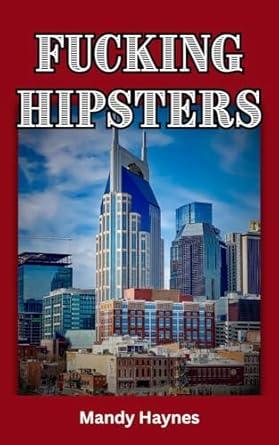

AWiregrass Childhood
Brenda Sutton Rose
During the early years of America, in the wiregrass country of Irwin County, Georgia, two brothers and a strange boy meet by chance in the local river that runs deep with memory and myth, history and vitality. Micah is a quiet, sensitive boy with a rare ear for music. His older brother, Isaac, watches the world with the steady eye of someone wiser than his years.And Oak, a Creek boy from a nearby village, carries the weight of his people's stories and the silent worry of what's to come. They didn't mean to find each other, yet somehow it seems fated to be. Friendship grows in the hush of pine forests and the music drifting from Micah's violin-friendship that defies the hard lines drawn between settlers and native people as they navigate a tumultuous time of tension between the Creek natives and white settles.
Blending history and fiction, A Wiregrass Childhood is a tender, haunting story of connection, land, and the quiet courage of boyhood.
“This beautifully written tale will appeal to folks from 8 to 80. The language is exquisite, the characters unforgettable, and the story has layers that are revealed like surprises pulled from a magician's top hat. There's music in this book that plays in your head long after you close the cover. You will want to read it again, and you will.” - FIVE STAR
READER REVIEW
“Brenda Sutton Rose is masterfully talented in how she weaves her story together. I eagerly awaited this book’s release after her incredible first book, Dogwood Blues, and she has amazed me yet again! A Wiregrass Childhood should be required reading for not only middle schoolers, but also for high schoolers and college students. Its deeply rich messages can be studied at length. Adults of any age will enjoy the book as well. This is not a book I will read one time and forget about like so many others. I will reread it over and over. I will share it. I will discuss it. I will ponder it. And… I will teach it! Its meaning is that important, infused with history and lessons that we should not forget. A Wiregrass Childhood is waiting for you!” -
FIVE STAR READER REVIEW
“A Wiregrass Childhood is the kind of book that draws you in instantly and makes you feel like you’re walking the red dirt roads of rural Georgia. What makes this book so special is how deeply it connects. Each chapter brims with warmth, humor, and the unshakable ties of friendship and place. Even if you didn’t grow up in the South, there’s something familiar in Rose’s writing — the small joys, the mischief, the lessons learned. Beautiful!”
- FIVE STAR READER REVIEW
Brenda Sutton Rose is the author of Dogwood Blues, a novel that earned her a GeorgiaAuthor of the Year nomination in 2015. She was nominated for a Pushcart Prize in Fiction in 2018 and another in 2023 for her short stories Sleeping on Paul’s Mattress and Samuel’s Wife. A Wiregrass Childhood, released inApril 2025, is her first novella. She lives in Georgia with her husband and three dogs.

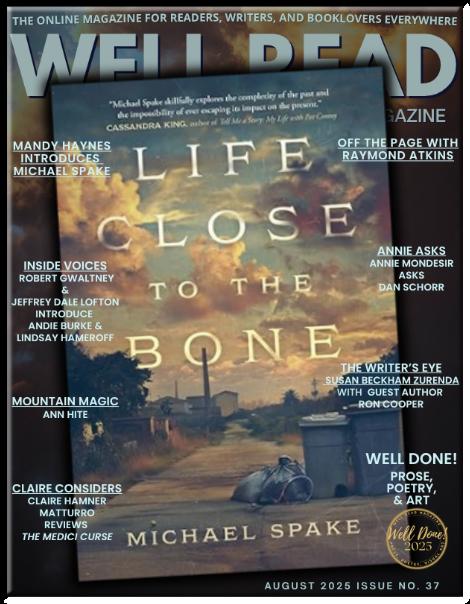
Did you miss last month’s issue? No worries, click here to find it as well as all the past issues.





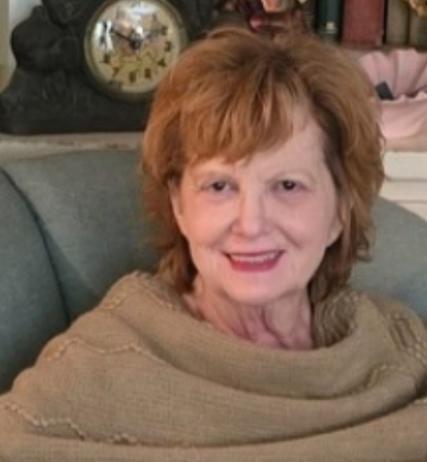
“When preparing the story, I kneaded as much truth into the dough as required to make it rise.”
MANDY HAYNES INTRODUCES
AUGUST’S FEATURED AUTHOR, BRENDA SUTTON ROSE
It is my honor to introduce you to this month’s featured author, Brenda Sutton Rose. Not only is she a fantastic author, she’s a very talented artist, and a wonderful human being.
I first “met” Brenda years ago on social media after the release of my first short story collection. I was scrolling through and stopped on a video to listen to one of the sweetest, soft-spoken, southern accents ever. Imagine my surprise when I realized she was talking about Walking the Wrong Way Home! I almost hit the the floor and I’m not going to lie, I probably replayed it five times. Then a couple years later, I got to meet her in person when she and her beautiful red-headed daughter, Alyson (who is the spitting image of her mama), surprised me at an event Live Ink Theatre put on for the same book when I lived on Amelia Island. After the event, we went to dinner and I laughed so much my face hurt. It honestly felt like we’d been friends for years. Y’all, that’s the kind of person Brenda is. See what I mean when I say she’s a wonderful human being?And that’s just one tiny example—you’ll read more in the following interview. The only thing that would make this better is if you could hear the answer’s in Brenda’s southern accent.
Tell us a little bit about the free library you have in front of your home – is it true the library played a part in your writing this novella?
I love the little free library and have since it was installed. My
husband and a man who helps him with household projects built it many years ago. Since then, I have discovered many thank you notes left inside for me, mostly from children, telling me how much they enjoy books being so accessible in the neighborhood. Because of how many children borrowed books from Dogwood Free Library that sits at the end of my driveway, I decided to write something young adults would find interesting. The seeds for a novella that would appeal to both young and old began spreading and taking root inside my chaotic and creative head. I wanted the youth living in today’s wiregrass region to know how life was for the early settlers, wanted them to understand the history of this place, wanted them to fall in love with nature.
When did the characters in A Wiregrass Childhood come to you and what order?
Three boys emerged early in the process. I grew up with four brothers and two sisters, so I began writing with a good bit of firsthand knowledge about young boys. My brothers and I played games such as Cowboys and Indians, War, and other games such as ones involving quicksand for boys. I also have a son, grown now, but I remember those youthful years with deep love. He and his cousins used sticks as lasers. The story of the three boys is set in the wiregrass region of Georgia during the early to mid-1800s, a dangerous yet extraordinary period of time when pioneers arrived to make their homes on untamed land belonging to the Creek Indians.
The first character I came to know through my writing was Micah, even though he appeared in the book after his older brother Isaac. Micah was different and easily bullied. He was sensitive and gifted in many ways.
Isaac, Micah’s older brother, took on much responsibility and looked out for Micah. Although unusual, Isaac loved the labor it took for him and his family to survive in the untamed wiregrass region.
The last of the three boys to appear was Oak, a Creek boy whose mother and uncle had died. Among the Creeks, the maternal side of the family were the role models for the children, and Oak had been left without his mother and without his only maternal uncle. Alone in many ways, Oak would not leave the wiregrass region to be relocated. He knew his home by heart. He knew it like he knew the curves of his bow and arrow. He felt the steady beating of his heart coming from the land. He heard the voices of his ancestors near the river.
The three boys’lives make the story of A Wiregrass Childhood.
Which character or scene was the most fun to write? Which scene was the hardest?
The music came from me as easily as breath. It took on wings and flew. Scenes involving music lifted me, turned me around, and carried me back to my youth and to my family, and the violin touched every corner of my heart. I also found it easy to write about Micah. I knew him as a mother knows a son.
The most difficult part to write was about the pain and suffering of the Creek Indians. To this day, in my mind, the souls of the Creek float in the river nearby.
I know that your novella is fiction, but there’s a lot of truth intertwined in the story. How did you do your research? What did you find that was the most interesting or surprising?
The research for this novella began more than a dozen years ago. My interest in local history, my family’s role as early pioneers, the beautiful and scandalous stories related to my ancestors—my findings filled numerous files. I bought all the history books I could find based on this region. I went through DNAtesting and searched through Census records, birth, death, and marriage records. War records. Pension records. Newspaper stories. Oh, goodness! I loved every minute of research! I learned a great deal about the Creek tribes. When preparing the story, I kneaded as much truth into the dough as required to make it rise.
A Wiregrass Childhood was published through The Horseman Press, which is the student-run book publication entity at Abraham Baldwin Agricultural College. Tell me how this came about.
When Dr. Rachael Price, advisor of Horseman Press, contacted me and asked what I was writing, she found the story quite interesting. It would be a good fit for an agricultural college. The college ownsThe Georgia Museum ofAgriculture which preserves
19th-century history. My novella was set in the 19th century in Georgia. Dr. Price’s students took on a great deal of the work involved in publishing. They handled editing, book cover, much of the promoting, and more.
You are a very talented writer, but you are also a very talented artist. How long have you been painting?What is your favorite type of medium? One more question – do your stories inspire your art, or vice versa?
I no longer can remember exactly how long I’ve been painting, but I became serious about it about twenty years ago. Music hides among my brushstrokes and in the paints. Stories often reveal themselves on my canvas. I am unable to describe my style. If there is a particular style of mine, it would best be described as what lives and grows and flourishes in me. I am old bones and new bones. It is my intention to create what I find to be deep and soulful, paintings that inhale and exhale, dance and bleed. I am a member of The Tuesday Colorists, a group of four extraordinary artists who meet to paint at my art studio once a week, usually on Tuesdays. We exhibit solo and as a group. These artists nourish me—we nourish one another.They would tell you that many of my works tell stories.
My paintings are normally oils, though you might come across one painted in acrylics from time to time. I use Michael Harding paints and absolutely love them. They feel as if they were mixed and prepared near the landscape of my youth. I can nearly taste the
rich pigments. I painted a large scene of longleaf pine and wiregrass while writing A Wiregrass Childhood. By getting lost in the painting, I fed my writing. The two often work hand in hand. Oh! And you, Mandy, own one of my paintings! “Leavin’ His SorryAss!” Now, that was a fun painting!
You have such a sweet family and I know they are all very proud of you – including yourfour-legged kids!Who is the first person you run a story by?
Thank you. I do have a supportive family. They bring me such joy, including my three dogs. Some of the readers might know Ahab. He is the oldest and largest of my dogs. He posts on Facebook with a bit of help from me. And dogs do tend to often show up in my writings. In Dogwood Blues, BB King was the protagonist’s dog. And in A Wiregrass Childhood, Butter Bone often sneaked into scenes. But you asked who the first person is that I run my stories by. That would be my son Patrick who reads nearly everything I write before it is published. When I created Micah for A Wiregrass Childhood, based loosely on him, he read it and approved it, even though Micah’s differences were on full display. He also gave me a great deal of feedback on Dogwood Blues. Patrick offers constructive criticism and runs ideas by me. His enthusiasm is contagious.
What are you reading these days?
Iamreading Ahab’s Wife again.Itisabookthatoftencallsmeback.
You’ve been very busy (and it looks like you’ve been having a lot of fun) promoting A Wiregrass Childhood. Have you had time to think about your next project?
I’ll make this answer short and simple.Yes. I am writing another book. Exciting!



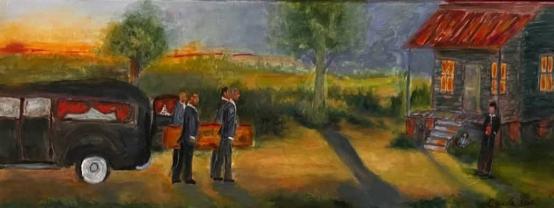
Above is a painting Brenda did for her story, Sleeping On Paul’s Mattress, which was nominated for a Pushcart Prize.
Click here to read this powerful piece.

“Leavin’His SorryAss!”
This painting by Brenda is one of my most treasured possessions. Y’all, she added my three pups - Pearl, Curly, and Moe…



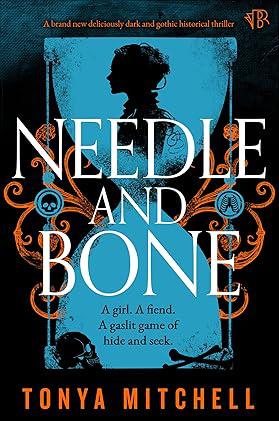
Needle and Bone by Tonya Mitchell She saw a murder. Now the ghost won't let her forget—and the killer won't let her live.
Philadelphia, 1841. Seventeenyear-old Annis Hargrave is running from a nightmare. She and her brother have fled New York, burdened by secrets, grief, and the cursed blue pearl that may have brought death in its wake. But the past refuses to stay buried.
Offered work as a medical illustrator by the enigmatic Dr. Thomas Mütter, Annis enters a world of surgical marvels and grotesque beauty. There, amid bottled organs and broken bodies, she begins to rebuild her shattered life—until the ghost of the girl she couldn’t save begins to appear.And the man who killed isn’t far behind.
As bodies begin to fall and her brother is taken, Annis must descend into the eerie depths of Mütter’s surgical amphitheater—
The Pit—for a final confrontation with the monster who haunts her…
Darkly atmospheric and emotionally gripping, Needle and Bone is a gothic tale of guilt, vengeance, and a girl’s fight to reclaim her soul from the shadows.
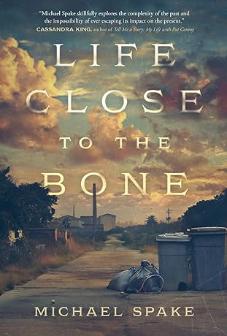
Life Close to the Bone by Michael Spake
John Greenburn used to be somebody. Now, he's just a middle-aged guy, sitting behind his computer screen, waiting for his life to come to a screeching halt. Cognitive-Pharma, a Florida-based pharmaceutical company with deep pockets and a secret to hide, has caught the attention of the U.S. Department of Justice. The allegation? Medicare fraud. No one is more on the hook than John, who, as the Chief Ethics Officer at Cognitive-Pharma, has been the canary inthecoalmineforthelast12months.NotthathisCEOcaresmuch.
The CEO, a flashy, profit-driven type, certainly doesn't care that John's own mother, Francis, is in desperate need of CognitivePharma's top-selling drug to slow her memory loss. Haunted by what he knows of the fraud allegations - and the investigation's impact on the thousands of patients who depend on the medicationJohn draws closer to the memories he has of his own mother, Francis, and the ways she pushed him to be somebody.And, not just somebody, but the greatest youth tennis player upstate South Carolina had ever known. With Francis' memory deteriorating, John's time to understand both himself and his mother, a product of the rough mill town that shaped her, is slipping away.
“Kerry Neville makes of dark matter a truly stunning memoir of hope and renewal, a work shot through with light, like a stained-glass window. Devoid of even one moment of sentimentality or falseness, the writing is as clear-eyed as it is memorable. She sees beyond surfaces, down to depths, up to immensities. The exactitude in her deployment of the brittle medium called language is not just constantly impressive but is uplifting and replenishing.
This unflinchingly courageous book from a writer whose work I love gives life to the profound truth that art can be redemptive.”
—Joseph O’Connor,
award-winning author of Star of the Sea and Ghost Light



Silver Echoes:AHistorical Roaring Twenties Novel (Gold Digger Biographical Fiction)
Rebecca Rosenberg
A Spellbinding Saga of Ambition, Identity, and Redemption. Based on a true story.
Chicago, 1920s: Movie starlet Silver Dollar Tabor's glittering life shatters after a brutal attack awakens a hidden self. Plunging into the city's dangerous underworld of burlesque speakeasies, she blurs the lines between ambition and destruction, testing her love for screenwriter Carl. This Jazz Age, Prohibition-era tale explores the dark side of fame and the fragility of identity.
Colorado, 1932: Haunted by Silver's disappearance, her mother, Baby Doe, fights to save their family's silver mine. A desperate search for her daughter unearths a shocking truth, rewriting their history. This dual timeline novel weaves a tale of resilience and the enduring bond between mother and daughter.
From the dazzling heights of the Flapper era to the rugged legacy of silver mining, Rebecca Rosenberg's "Silver Echoes" delivers a gripping historical fiction experience. Baby Doe Tabor's relentless quest for truth unearths the secrets of Silver Dollar Tabor. Perfect for fans of strong women in historical novels and stories based on real events.
What really happened to Silver Dollar Tabor?And can her mother uncover the truth before it’s too late?
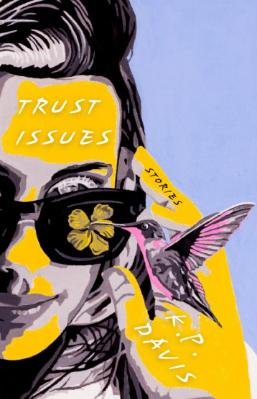
Trust Issues: Stories by K. P. Davis
COMING SOON
Someone or something lurks around every corner, but K.P. Davis’s characters have come prepared. These are women carrying on their daily struggles in a dangerous world, striving and searching for safety. They include Nell, an antisocial, nomadic, shade-tree mechanic and getaway driver; ‘Bula, an odd girl who talks to animals; and a whole host of others who follow lonely paths spreading empathy while kicking ass. The endings aren’t always happy,andthesewomenhaveplentyofreasonstobeafraid,butthey keep on going. The twenty sharp, poignant, and biting stories in Trust Issues comprise a stunning beacon for hard-headed folk fighting to be heard when nobody listens.
“Kim Davis is a master of moments. In Trust Issues, she brings her keen eye to the lives of ordinary people not often seen in literary fiction. With great skill, Davis shows how even the most mundane moments are fraught with meaning.” —Maurice Carlos Ruffin author of The American Daughters
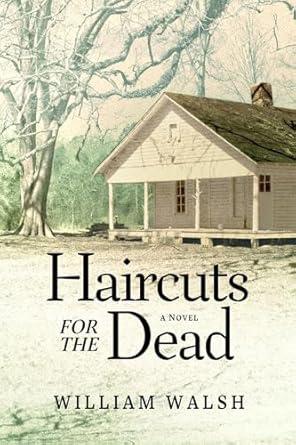
Haircuts for the Dead by William Walsh
When twenty-one-year-old Hannah Gardner's father sells the family farm, she is cast onto the streets of Sundown, Georgia, where, having left her fundamentalist church, she grapples with the weight of her family's racist past. Working as a shampoo girl at a rinky-dink salon, Hannah tries to make ends meet cutting hair at the local funeral home. After finding herself in a precarious situation where she is raped by Hawkshaw Bales, a local criminal, Hannah is blackmailed by Bales to take custody of the resulting child. When Hannah is befriended by Margaret, the Black librarian, their interracial friendship develops into a love affair where Hannah finds the tenderness and protection she needs. Despite all the trials Hannah endures, she keeps a journal, her "Document of Life," and records Bible verses to show that even when you turn away from "God's steady light, He lives within you."With each haircut she gives at the funeral home, Hannah sends her customers to the hereafter with honor.
"In Hannah Gardner's search for both a place and a love that feel like home, William Walsh has given us a rollicking tale of a charming heroine healing an injured heart and conquering a small part of a great big world." --Jessica Handler, author of THE MAGNETIC GIRL

EndTimesbyJohnM.Williams
Brother and sister soulmates Jon Karl and Summer Odom, orphaned at an early age and thrust into the human comedy of a small southern town, must survive a variety of predators, especially a sociopathic barber who abducts Jon Karl, forcing Summer to access a surprising inner strength that changes both their lives.
After the death of their mother, Maryrell, Jon Karl and Summer Odom are raised in the town of Douvale by their grandmother, Mildra, whose boss, Spruill Dawes, steps into the role of surrogate father. Jon Karl befriends his son Millard. Jon Karl, sexually precocious, finds himself increasingly humiliated by the ravenousness of Douvale women and yearns for a hermit life while mythologizing the few women he likes to think actually loved him. Summer attracts oddball boys which sends her through a series of ill-suited males and strange jobs.
Complications arise when Balch, a local barber, becomes obsessed with Jon Karl, and even more arise when Jon Karl catches the eye of Vance, a young strip club owner and porn filmmaker. Then, when Jon Karl gets into an ill-advised cannabisgrowing scheme, he leaves himself vulnerable to blackmail by Vance. Things get worse when Jon Karl is sentenced to the for-profit Baptist correction center run by Spruill’s hated rival, PruetEchols, and he finds Balch working there. One day, Summer’s intuition of something wrong sends her, Spruill, and the sheriff into a ghastly scene and a dangerous rescue of Jon Karl. Jon Karl is released to pursue at last the life he longs for, but becomes increasingly seduced by the strange energy of an abandoned roadside house and the oddly familiar portal it seems to offer. Summer has uneasy premonitions about the house, and with the legacy of a young son from one of her earlier boyfriends, and at last a promising relationship with the latest, survives.
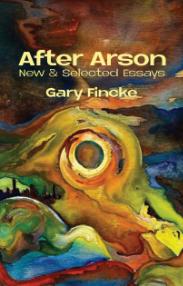
This essay collection spans a lifetime’s worth of characters, settings, themes, and ways of organizing. It is, after all, a collection of Gary Fincke’s best work. Yet, for the variety of content covered, from coming-of-age to family to nuclear weapons to space exploration to mass shootings to rock attacks on cars to the author’s mother’s obsession with potato chips, this collection has a durable thread that ties them all together: the need to observe and record everything. Struggle and resilience. Fear and pleasure. Faith and despair. Love and loathing.All of those tensions are closely examined within the shadow cast by death.As Gary Fincke writes, “Somewhere, early every day, I think the acolyte of terror dreams our bodies as it decides the exact address for delight.” This “thinking,” in essay after essay, is brilliantly articulated in an ever-evolving, contemporary style. The metaphors are beautiful, the prose is clipped and clean, and the reader is constantly surprised by the connections Fincke draws like the one between his daughter and Charles Manson. A panorama of screams, another of hearts, another of headlights, all of them transformed into memoir. The subjects as varied as a four-part exploration of different kinds of hands, a meditation on terror and the fireworks American children know as Sparklers, and eulogies seeded by love of potato chips and crossword puzzles. Like the best essays, all of these “discover” in an intimate, personal way.
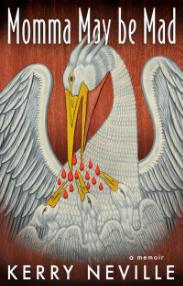
Momma May Be Mad: A Memoir is an inventive and striking memoir about motherhood, madness, and the grace of second and third chances. Kerry Neville shares the story of how she was caught in the perfect storm of bipolar disorder, anorexia, and alcoholism when her children were young and her marriage failing and how she found her way back to joy and hope. Electric shock therapy, hospitalizations, and even an exorcism were desperate, if failed, lifelines. But even in that dark chaos, she held fast to an abiding belief in love and fought to regain her own life and her life with her children.

poems and songs by karla k. morton andAlan Birkelbach with music by Michael Martin Murphey and art by Bob Boze Bell
This is a special, limited edition hardback with music CD of songs recorded by Michael Martin Murphey.

MADVILLE PUBLISHING seeks out and encourages literary writers with unique voices. We look for writers who express complex ideas in simple terms. We look for critical thinkers with a twang, a lilt, or a click in their voices. And patois! We love a good patois. We want to hear those regionalisms in our writers’ voices. We want to preserve the sound of our histories through our voices complete and honest, dialectal features and all. We want to highlight those features that make our cultures special in ways that do not focus on division, but rather shine an appreciative light on our diversity.

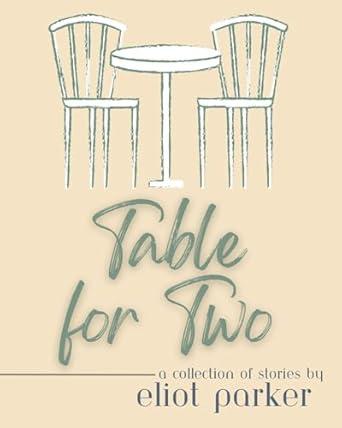
Winner of the 2025 Eric Hoffer Prize for Short StoryAnthology
This prestigious recognition celebrates excellence in storytelling and highlights Parker’s talent for crafting compelling narratives that resonate with readers.


Wayward Girls by Claire Matturro and Penny Koepsel
"Wayward Girls" is a portrait of brave sisterhood, infused with beauty and exquisite pain. Your heart will melt with every turn of the page." Laura Benedict, Edgar-nominated author of The Stranger Inside
"Wayward Girls delivers suspense, emotional depth, social commentary, and a gripping story. Grab a copy, a box of tissues, and the phone number of your oldest friend, because you're going to want to talk about this one after you turn the last page. It's a terrific book."
Mary Anna Evans, author of the Faye Longchamp Mysteries
When late-night phone calls summon Jude Coleridge and Camille Prescott back to the Talbot Hall School for Girls, painful memories bombard them. Though estranged for years, both bear the physical and emotional scars from their youth.
At the boarding school, they were branded “the crazy girls, the ones who lie” and became unlikely best friends. They soon formed a trio with a new student, WandaAnn, who pulled them into her bewildering relationship with the school psychologist, Dr. Hedstrom. But Wanda Ann’s wild stories masked a truth that threatened to engulf them all.
As teens, the girls could only rely on each other as they moved toward an unfathomable, fiery danger. Now, in the crumbling halls of Talbot, hours before the building’s demolition, they must grant forgiveness, to themselves and others, if they are to move forward.

The Home for Wayward Girls: A Novel by
Marcia Bradley
While other adolescent girls are listening to grunge rock or swooning over boy bands and movie stars, Loretta knows little of life beyond the Home for Wayward Girls, the secluded ranch where her parents run a program designed to “correct” teen girls’ “bad behavior.” Some new residents arrive with their moms and dads, while other are accompanied by transporters— people paid to forcibly deliver these “problem” teens—girls caught swearing, smoking, drinking, or kissing. Many are failed runaways desperate to leave their controlling and sometimes brutal homes. Few have any idea of the suffering that lies ahead.
Loretta witnesses firsthand how the adults use abusive discipline to crush these young women’s spirits and break their wills. She understands these girls’ pain and shares it. Since childhood she’s been afraid of her father, and avoids him by spending time with the residents, secretly teaching them the survival skills they’ll need in case they manage to escape. Until the day a horrifying act of violence forces her to make her own terrible choice.Terrified and with no other option, Loretta flees the ranch and hitchhikes across the country, ending up in New York. Eventually finding safety and a sympathetic community, Loretta dedicates herself to working with lost, vulnerable, and defenseless teens, determined to prevent the same thing from happening to other girls like her.
“This
sassy first novel from Brenda Sutton Rose captures some of the conflicted and captivating characters of a rapidly changing South.”
~ Janisse
Ray, author of Ecology of a Cracker Childhood Dogwood Blues: Southern Fiction Damp from theAlapaha River
Brenda Sutton Rose

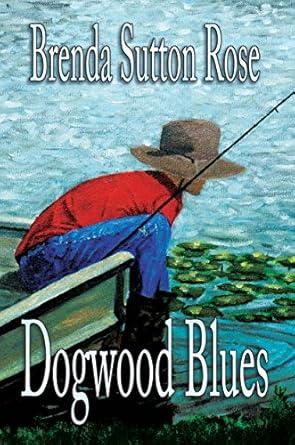

"Freedom's Eve" is a historical fiction children's book that follows Layla, a little mouse living in an antique shop, who is magically transported back to a South Carolina plantation during the Civil War era by the spirit of Hawa, a young enslaved girl. Through Hawa's guidance, Layla witnesses the realities of slavery from New Year's Eve 1862 (when the Emancipation Proclamation took effect) through the eventual freedom that came in 1865. The story explores the daily lives, struggles, and resilience of enslaved people, their rich Gullah culture and language, and their journey to freedom. Written by Dawn Caldwell with illustrations by Bryce Caldwell, the book aims to teach honest history about slavery while honoring the strength and cultural heritage of the Gullah people.

Deep in the Northern Thicket, a cold wind blows. Tradition mandates the flock remain through the winter, and The Elders are big on following the rules.Wooblers are a serious breed who spend most of their time attending to important matters requiring somber faces. But Leader of the Flock has a deep, dark secret . . . and their most misunderstood member has uncovered it. Will the Wooblers have the faith to change? Things are about to get more colorful.

Learning to Fly, One Story at a Time
About Baby Crow:
"At Baby Crow, we believe in nurturing a lifelong love of reading, one story at a time. Our mission is to create inspiring, imaginative, and educational children's books that celebrate diverse voices and spark curiosity in young readers. We aim to unlock the doors to future success by encouraging children to discover the magic of books and storytelling."

At Colorful Crow Publishing, our mission is to amplify diverse voices and champion stories that resonate across communities. We believe every story matters, and we are dedicated to creating a welcoming, supportive platform for authors to share their unique perspectives. By fostering a collaborative environment, we aim to publish works that inspire, connect, and make a lasting impact on readers everywhere.

In Volume One, you’ll find thirty-eight submissions writtenbyafantasticmixofawardwinning authors and poets plus new ones to the scene. Three submissions in this volume were nominated for a Pushcart Prize: Miller’s Cafe by Mike Hilbig, Sleeping on Paul’s Mattress by Brenda Sutton Rose, and A Hard Dog by Will Maguire. The cover art is by artist, Lindsay Carraway, who had several pieces published in February’s issue.
Contributors: Jeffrey Dale Lofton, Phyllis Gobbell, Brenda Sutton Rose, T. K. Thorne, Claire Hamner Matturro, Penny Koepsel, Mike Hilbig, Jon Sokol, Rita Welty Bourke, Suzanne Kamata, Annie McDonnell, Will Maguire, Joy Ross Davis, Robb Grindstaff, Tom Shachtman, Micah Ward, Mike Turner, James D. Brewer, Eileen Coe, Susan Cornford, Ana Doina, J. B. Hogan, Carrie Welch, Ashley Holloway, Rebecca Klassen, Robin Prince Monroe, Ellen Notbohm, Scott Thomas Outlar, Fiorella Ruas, Jonathan Pett, DeLane Phillips, Larry F. Sommers, Macy Spevacek, and Richard Stimac
InVolumeTwo, you’ll find fortythree submissions written by a fantastic mix of award-winning authors and poets plus new ones to the scene. Three submissions in this volume were nominated for a Pushcart Prize: A Bleeding Heart by Ann Hite, A Few Hours in the Life of a Five-Year-Old Pool Player by Francine Rodriguez, and There Were Red Flags by Mike Turner. The cover art for Volume Two is by artist, DeWitt Lobrano, who had several pieces published in November’s issue. Enjoy!
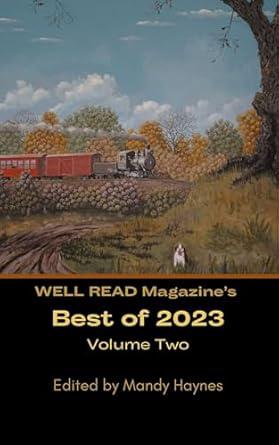
Contributors: Ann Hite, Malcolm Glass, Dawn Major, John M. Williams, Mandy Haynes, Francine Rodriguez, Mike Turner, Mickey Dubrow, William Walsh, Robb Grindstaff, Deborah Zenha Adams, Mark Braught, B. A. Brittingham, Ramey Channell, Eileen Coe, Marion Cohen, Lorraine Cregar, John Grey, J. B. Hogan, Yana Kane, Philip Kobylarz, Diane Lefer, Will Maguire, David Malone, Ashley Tunnell, Tania Nyman, Jacob Parker, LaVern Spencer McCarthy, K. G. Munro, Angela Patera, Micheal Spake, George Pallas, Marisa Keller, Ken Gosse, and Orlando DeVito
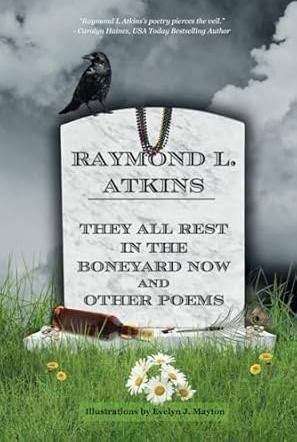
TheyAll Rest in the Boneyard Now by
Raymond L.Atkins (Author), Evelyn Mayton (Illustrator)
“Raymond Atkins writes with intuitive wisdom, as he channels those from beyond the grave. His poetry gives voice to those who once mattered, those who time wants us to forget. In They All Rest in the Boneyard Now, Atkins wrestles death from the dusty clay and breathes life into dry bones while reminding us that every soul who once had breath is worthy of being remembered. These saints, sinners, socialites, and the socially inept are all victims of time, or circumstance, as we too shall one day be. Atkins offers salvation to all who are tormented, and solace to those who seek eternal rest.”
– Renea Winchester,Award-winning author of Outbound Train
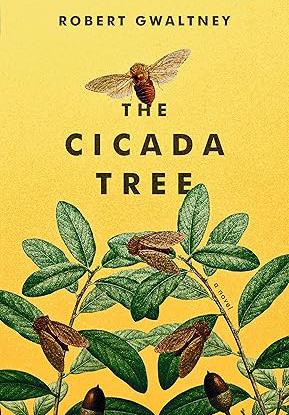
The Cicada Tree by
Robert Gwaltney
The summer of 1956, a brood of cicadas descends upon Providence, Georgia, a natural event with supernatural repercussions, unhinging the life of Analeise Newell, an eleven-year-old piano prodigy. Amidst this emergence, dark obsessions are stirred, uncanny gifts provoked, and secrets unearthed.
During a visit to Mistletoe, a plantation owned by the wealthy Mayfield family, Analeise encounters Cordelia Mayfield and her daughter Marlissa, both of whom possess an otherworldly beauty, a lineal trait regarded as that Mayfield Shine. A whisper and an act of violence perpetrated during this visit by Mrs. Mayfield all converge to kindle Analeise’s fascination with the Mayfields.
Analeise’s burgeoning obsession with the Mayfield family overshadows her own seemingly, ordinary life, culminating in dangerous games and manipulation, setting off a chain of cataclysmic events with life-altering consequences—all of it unfolding to the maddening whir of a cicada song.
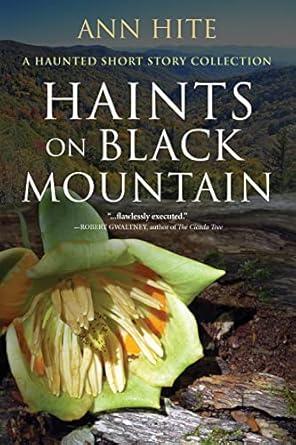
Haints on Black Mountain:AHaunted Short Story Collection by Ann Hite
Ann Hite takes her readers back to Black Mountain with this haunted short story collection.
An array of new characters on the mountain experience ghostly encounters. The collection took inspiration from her beloved readers, who provided writing prompts. Wrinkle in the Air features Black Mountain's Polly Murphy, a young Cherokee woman, who sees her future in the well's water. Readers encounter relatives of Polly Murphy as the stories move through time.The Root Cellar introduces Polly's great grandson, who tends to be a little too frugal with his money until a tornado and Polly's spirit pays the mountain a visit. In The Beginning, the Middle, and the End, readers meet Gifted Lark on an excessively frigid January day. This story moves back and forth between 1942 and 1986 telling Gifted and her grandmother Anna's story. This telling introduces spirits that intervene in the spookiest of ways.
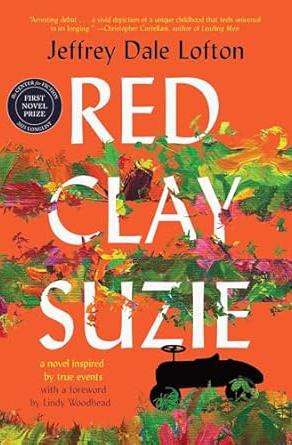
Red Clay Suzie by
Jeffrey Dale Lofton
Anovel inspired by true events. The coming-of-age story of Philbet, gay and living with a disability, battles bullying, ignorance, and disdain as he makes his way in life as an outsider in the Deep South—before finding acceptance in unlikely places.
Fueled by tomato sandwiches and green milkshakes, and obsessed with cars, Philbet struggles with life and love as a gay boy in rural Georgia. He’s happiest when helping Grandaddy dig potatoes from the vegetable garden that connects their houses. But Philbet’s world is shattered and his resilience shaken by events that crush his innocence and sense of security; expose his misshapen chest skillfully hidden behind shirts Mama makes at home; and convince him that he’s not fit to be loved by Knox, the older boy he idolizes to distraction. Over time, Philbet finds refuge in unexpected places and inner strength in unexpected ways, leading to a resolution from beyond the grave.

The Smuggler's Daughter by
Claire Matturro
Ray Slaverson, a world-weary Florida police detective, has his hands full with the murders of two attorneys and a third suspicious death, all within twenty-four hours. Ray doesn’t believe in coincidences, but he can’t find a single link between the dead men, and he and his partner soon smash into an investigative stonewall.
Kate Garcia, Ray’s fiancée, knows more than she should. She helped one of the dead attorneys, just hours before he took a bullet to the head, study an old newspaper in the library where she works. Kate might be the only person still alive who knows what he was digging up— except for his killer.
When Kate starts trying to discover what’s behind the murders, she turns up disturbing links between the three dead men that track back to her family’s troubled past. But she has plenty of reasons to keep her mouth shut. Her discovery unleashes a cat-and-mouse game that threatens to sink her and those she loves in a high tide of danger.

The Bystanders by Dawn Major
The quaint town of Lawrenceton, Missouri isn’t sending out the welcoming committee for its newest neighbors from Los Angeles—the Samples’ family. Shannon Lamb’s “Like a Virgin” fashion choices, along with her fortune-telling mother, Wendy Samples, and her no-good, cheating, jobless, stepfather, Dale Samples, result in Shannon finding few fans in L-Town where proud family lines run deep. Only townie, Eddy Bauman, is smitten with Shannon and her Valley Girl ways. The Bystanders is a dark coming-of-age story set in the 1980s when big hair was big, and MTV ruled. In a quiet town of annual picnics and landscapes, the Samples’ rundown trailer and odd behaviors aren’t charming the locals. Shannon and Wendy could really use some friends but must learn to rely upon themselves to claw their way out of poverty and abuse if they want to escape Dale.
The Bystanders pays homage toAmericana, its small-town eccentricities, and the rural people of the Northern Mississippi Delta region of Southeast Missouri, a unique area of the country where people still speak Paw Paw French and honor Old World traditions.

The Girl from the Red Rose Motel:ANovel by Susan Beckham Zurenda
Impoverished high school junior Hazel Smalls and privileged senior Sterling Lovell would never ordinarily meet. But when both are punished with in-school suspension, Sterling finds himself drawn to the gorgeous, studious girl seated nearby, and an unlikely relationship begins. Set in 2012 South Carolina, the novel interlaces the stories of Hazel, living with her homeless family in the rundown Red Rose Motel; Sterling, yearning to break free from his wealthy parents' expectations; and recently widowed Angela Wilmore, their stern but compassionate English teacher. Hazel hides her homelessness from Sterling until he discovers her cleaning the motel's office when he goes with his slumlord father to unfreeze the motel's pipes one morning. With her secret revealed, their relationship deepens. Angela-who has her own struggles in a budding romance with the divorced principal-offers Hazel the support her family can't provide. Navigating between privilege and poverty, vulnerability and strength, all three must confront what they need from themselves and each other as Hazel gains the courage to oppose boundaries and make a bold, life-changing decision at novel's end.
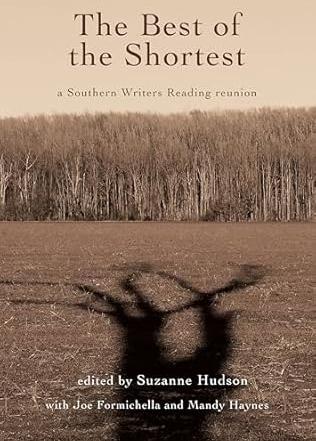
The
Best of the
Shortest:
ASouthern Writers Reading Reunion by
Suzanne Hudson (Author, Editor), Mandy Haynes (Editor), Joe Formichella (Author, Editor)
“Some of the happiest moments of my writing life have been spent in the company of writers whose work is included in these pages. They all brought their A-game to this fabulous collection, and at our house it is going on a shelf next to its honored predecessors. The only thing that saddens me is that the large-hearted William Gay is not around to absorb some of the love that shines through every word.” ―Steve Yarbrough
“The Best of the Shortest takes the reader on a fast-paced adventure from familiar back roads to the jungles of Viet Nam; from muddy southern creek banks to the other side of the world, touching on themes as beautiful as love and as harsh as racism. However dark or uplifting, you are guaranteed to enjoy the ride.” --Bob Zellner
“I had some of the best times of my life meeting, drinking and chatting with the writers in this book, times matched only by the hours I spent reading their books. This collection showcases a slice of Southern literature in all its complicated, glorious genius. Anyone who likes good writing will love it.” --Clay Risen

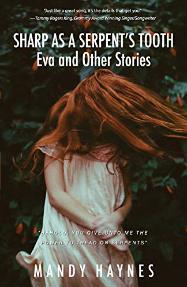
Walking The Wrong Way Home by Mandy Haynes
Spanning nearly twenty decades, the struggles and victories these characters face are timeless as they all work towards the same goal.
A place to feel safe, a place to call home.
Sharp as a Serpent's Tooth: Eva and other stories by Mandy Haynes
Each story features a female protagonist, ranging from ten to ninety-five years of age. Set in the south, you’ll follow these young women and girls as they learn that they’re stronger than they ever thought possible.
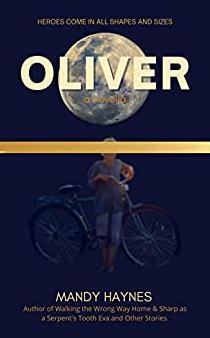
Oliver by Mandy Haynes
“Dear God…and Jesus and Mary…” Even though eleven-year old Olivia is raised Southern Baptist, she likes to cover her bases when asking for a favor. Unlike her brother Oliver, she struggles with keeping her temper in check and staying out of trouble. But Oliver is different, and in the summer of ’72 he proves to Olivia there’s magic in everything - it’s up to us to see it.
Mandy Haynes spent hours on barstools and riding in vans listening to great stories from some of the best songwriters and storytellers in Nashville, Tennessee. After her son graduated college, she traded a stressful life as a pediatric cardiac sonographer for a happy one and moved to an island off the east coast. She is a contributing writer for Amelia Islander Magazine, Amelia Weddings, and editor of Encounters with Nature, an anthology created by Amelia Island writers and artists. She is also the author of two short story collections, Walking the Wrong Way Home, Sharp as a Serpent's Tooth Eva and Other Stories, and a novella, Oliver. She is a co-editor of the Southern Writers Reading reunion anthology, The Best of the Shortest. Mandy is the editor-in-chief of WELL READ Magazine and the editor of four WELL READ anthologies.
Like the characters in some of her stories, she never misses a chance to jump in a creek to catch crawdads, stand up for the underdog, or the opportunity to make someone laugh. At the end of 2024, Mandy moved back to middle Tennessee and now spends her time writing and enjoying life as much as she can.

You can find books from past issues as well as current books to add to your reading list.

Happy reading!
If you’d like to feature your work in the reading recommendation section with live links to your website and purchase link, and personalized graphics of your ad shared to WELLREAD Magazine’s social sites, click here to see examples of the different options and moreinformation.
Click here for more information on purchasing a cover.
Don’t let the low prices fool you - WELL READ was created by an author who understands how much it costs to get your book in the best shape possible before it’s ready to be queried by agents, small presses, or self-published. Showing off your book and getting it in front of readers shouldn’t break the bank.
WELL READ Magazine receives approximately 8,000 views each month on Issuu’s site alone (the world’s largest digital publishing and discovery platform available). Your book will be included with the featured authors, great interviews, submissions, essays, and other fantastic books inside each issue. There is strength in numbers. Let’s get our books seen!
Ad rates for 2025:
$50 - One FULL PAGE AD
$75 - TWO-PAGE SPREAD
$100 - TWO HIGH IMPACT - FULL COLOR PAGES - (this is NOT a standard two page spread)
$100 - TWO-PAGE SPREAD to advertise up to THREE books with one live link to your website. For publishers only.
$75 BOOKSTORES, PUBLICISTS, AUTHORS - two-page spread to promote book events
$550 FRONT COVER - includes TWO full color interior pages for book description, author bio, and/or blurbs.
$350 INTERIOR COVER or BACK COVER - includes TWO additional full color interior pages for book description, author bio, and/or blurbs.
*All covers include a one page ad in the next three consecutive issues following the month your book is featured on a cover.
Prices include creating the graphics for the magazine pages and all social sites. Everything is taken care of for you.

“I
INSIDE VOICES
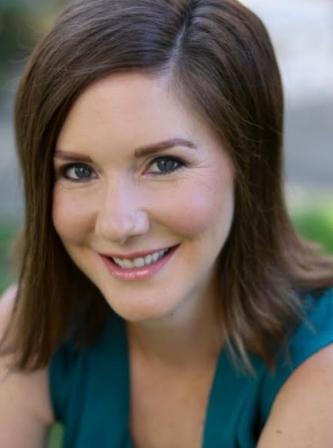
love to imagine people at various points on the spectrum of their lives, so to get to write a character from two different perspectives is a real treat for me.”
Robert
Gwaltney and Jeffrey Dale Lofton introduce Author, Lo Patrick
Lo Patrick is a former lawyer and current novelist living in the suburbs ofAtlanta. Her debut, The Floating Girls, earned a starred review from Publisher’s Weekly, was a finalist for the Townsend Prize for Fiction, and was a Reader’s Digest Editor’s Pick. It was named by the Georgia Center for the Book, a book all Georgians should read. She is also the author of The Night the River Wept. Her latest novel, Fast Boys and Pretty Girls was published July 8, 2025.
Inside Voices (Jeffrey): Let’s start by having you discuss a pretty girl, your protagonist, Danielle Greer. She is layered: a mother, former model, and emotionally haunted woman. Tell us how her voice found its way to you.
I worked in the modeling industry while in my early twenties. It was a time of profound transition for me; when I took that job I was hoping to leave a lot of my childish antics and indiscretions behind and become what I considered a ‘professional’, which is probably what a lot of my clients were attempting to do with their modeling careers—exactly that, have a career. I am an avid people watcher, in every area of my life, but found the people watching in a Los Angeles modeling agency was not to be topped. The girls (and boys/young men) I met through my job were vulnerable, ambitious, trying to find their voice, their way, something that made sense for them to be chasing, and an identity that matched
what everyone was telling them about who they were and who they would become. There was a tremendous amount of confusion and frantic insecurity. I was never able to forget about those girls and their collective upheaval. I tried to imagine the kind of worlds they came from and that was where Dani was born. She is entirely fictional, but I imagine that she—for better or for worse—is not too far a stretch for a lot of young women who are plucked from the familiarity of their small town lives simply for being beautiful, and what that designation—the pretty girl—does to their bigger picture of their life.
Inside Voices (Robert): We’ve covered pretty girls, now let’s chat a little about fast boy, Benji Law. What makes characters like him so captivating, even dangerous?
For whatever reason, a lack of engagement, a scintillating apathy if you will, can sometimes draw people in. Everyone thinks they will uncover the secret truth about this unreachable person who lives their life so on the edge, so detached, so entirely in their own world without any apparent need for anyone else is riveting. I think people like Benji are especially appealing when a person is dealing with their own lack of direction or sense of self.The Benjis of the world gain power from those of us who are searching for meaning or reason in what is otherwise chaos. It seems counter intuitive, but I suppose unlocking the secret door for such an
enigmatic charmer like Benji—who is really just a reckless kid without much of a home life or education—seems like striking gold, especially to someone like Danielle who is desperately trying to figure out who she is and where she fits in the world. Benji suddenly seems like the answer. And the most compelling thing about Benji, ultimately, is that he is not as driven or directed as everyone else Danielle is meeting. He’s a teenager, like she was before she met Frank Dabney.
Inside Voices (Jeffrey): The dynamic between Danielle and her mother is challenging one. Share a little about Danielle’s mother and the nature of their relationship.
Danielle’s mother, Deb, has always been a powerful force in her family’s life—the real spitfire of the unit. When Danielle is picked to model, Deb is suddenly out of her element, cast aside for a world that is far more sophisticated and ‘elite’. She holds her own but is thrown off balance by how out of place she is and how superfluous to her daughter’s life she has suddenly become. I think Deb also struggles with the fact that Danielle found so much trouble back at home, in Pressville. She blames Danielle’s choices on living in NewYork and how that warped her, but it troubles her that the real issues started in their back yard. I also think it speaks to Deb’s intuitiveness that she realizes Danielle’s vulnerability as a result of her struggles in the modeling and fashion worlds are the reason she
was so susceptible to someone like Benji. Deb is a fiery person and mother on the surface but is actually a very simple, small town woman trying to make sense of what is happening to her family.
Inside Voices (Robert): The novel moves between 2004 and 2019. How did you approach writing across two timelines?
I thoroughly enjoy books that move between periods of time, so I am obviously drawn to writing them as well. I love to imagine people at various points on the spectrum of their lives, so to get to write a character from two different perspectives is a real treat for me. Danielle struggles with forward motion in her life, and it was fascinating for me as an author to capture her thwarted internal development and how she was not able to separate herself from her past. I think many, if not most, people who have experienced great shame or trauma, have a very hard time creating a life for themselves that does not revolve around their worst moment(s).
Inside Voices (Jeffrey): What challenges or freedoms did you experience while writing a story rooted in a teenage love that shadows into adulthood?
I think sometimes I was hard on Danielle and had to pull myself back from being too judgmental about her in the narrative. A
person only knows what they know—especially at different stages of development. It was difficult to write her without criticism as a grown woman who has seen this kind of thing before. Obviously, the nineteen year old Danielle, did not know what I know as an adult woman. I had to stop myself from being angry with her and allow her to make the mistakes that shaped her life.
Inside Voices (Robert): Obsession, memory, identity, secrets, and first love all play central roles in this novel. What drew you to these particular emotional landscapes?
I am drawn to coming of age stories generally. I find the evolution of a girl into a woman a timeless, un-exhausted concept that is able to encompass so many other, intricate, nuanced themes that any person can relate to—even if only a little bit. When we are young, our secrets define us.We live by the stories we think are too important, too precious to share. When we get older, I think many of us realize that our experiences are not all that singular and that most people we know have been shaded with the same charcoal. Everyone has a ‘past’, things they regret, wish they hadn’t done, would rather die than admit to. The isolation that develops around shame is all encompassing. It takes a person away from others and alienates them. I find the way that we are able to exclude ourselves because of difficult experiences, instead of using them as a way of connecting, is fascinating. Danielle is yet another young woman who thinks everything she experienced at one point in her life is
tainted, unforgivable, insurmountable—a stain. This belief in her own wrongdoing changes her; the regret creates a new Danielle.
Inside Voices (Jeffrey): This novel explores how small-town communities bury secrets. You wrote a piece for Crime Reads: Closeness Breeds Contempt: On Small Town Mysteries. This is a quote: “The minute something really bad happens in a small community, locals start to wonder where the rot came from.” Why are you drawn to writing about small towns?And why do you think readers love to visit?
Small towns often lack the clutter—aesthetically, socially, culturally…the list goes on and on…of more populated cities and areas.Things are able to SHINE in a small town in both a good and bad way. I think people—myself included—romanticize what it would be like to be so well known, so appreciated, so available when in reality all of that connection just makes a virus spread faster. The good, the bad, and the ugly are quicker to fester. There is a dynamic in a smaller community that allows the interpersonal element to permeate more readily which of course makes for better stories.
Inside Voices (Robert): Did you always know how the story would end, or did that evolve as you wrote it?
My books always evolve as I write. There is a point at which I definitely know what is going to happen and then I can write in that direction, but I do try to allow my characters to tell me what’s going on and what they need in order to resolve the story. I do a ton of editing on the back end of finishing a manuscript; for me that is where the magic happens, because I usually have to wait until about two thirds of the way through to know what exactly I’m writing.
Inside Voices (Jeffrey): Lo, what is next for you?
I have a book coming out next summer (fingers crossed!) called The Sins of Summer Daughters. I won’t say more as we are still in the editing phase, but…I’m thrilled!

"Patrick is skilled at creating a sultry Southern atmosphere and moody smalltown suspense… traits which mark the author’s previous books, and which she delivers again here, along with complicated characters and interesting relationship dynamics. This one ends strong, with a surprising reveal." ― Library Journal, STARRED review
Fast Boys and Pre�y Girls: A Novel Lo Patrick



Click above to go to the BETWEEN THE PAGES YouTube channel, or on one of the links below to listen to the podcast. Please take a second to like and subscribe if you enjoy the channel - we appreciate you!






MOUNTAIN MAGIC with ANN HITE
A Half Is Part Of A Whole
AHalf Is Part OfAWhole
When one is writing a column about mountain magic and one is not sure there is any magic in the story, one trusts the mountains to show her the way.
What is a half of a whole? This should be self-explanatory. If I look at one of Granny’s buttermilk pies she made when folks were coming to visit, I totally understand the math. But if I look at a label such as, half-sister or half-brother, the water becomes murky for me.
My granny’s best friend as a child was her “half” brother, Obar. His mother was the only mama Granny knew from the age of six until she was an adult. I knew Bell. Her real name was Isabelle, which didn’t fit the overweight, housebound woman I visited as a child. Later as an adult, I could envision what Isabelle looked like when she came to live with Granny two weeks after her mother, Asalee, died tragically. Obar was Granny’s age, meaning she and Obar’s father, Henry Lee, kept two families hidden or not from the two wives in his life.
All my life I thought of Obar as Granny’s full-blood brother. I was raised to believe this because to Granny and Obar, they were brother and sister. Only as an adult did I learn the truth.
Imagine how I felt, the questions I had, when my mother and dad explained to me at the age of six in a couple of short sentences that I had a half-sister and brother much older than me. My questions were never permitted. I would later understand my parents were protecting me. I was the cherished daughter from an affair that ended Dad’s first marriage. My existence as a sister to my two siblings was doomed before I was born, tangled in resentment and heartache. I was sentenced to be half, not quite what it took to be included.
One can’t take half of a buttermilk pie to a family reunion, when the tables are filled with untouched homemade desserts.
As a grown woman, with grown children of my own, I was fortunate to have several phone conversations with my sister. During one of these talks, my sister told me of my mother and father’s affair. How it caused a divorce and heartbreak to her family. I was unaware of the affair at that time because Mom and Dad never told this part of the story. But, as soon as I heard her words, I knew it was true. So many things from the past were explained. Questions answered.
Dear Readers, we never truly hide stories from children. They are so smart and always know something is off. The lie or secret rides in the sweet clean air. Just waiting for someone to catch on to them.
My sister went on to tell me, while she saw I loved my dad with all my heart, she did not call him her father, so bitter was her heart. She removed herself from any outreach that he made toward her. Talking to me was painful for her because it revealed all she had missed when he left her family. My existence was proof she could be replaced. I made the decision, not lightly, to walk away. She died three years later without us having spoken again. Not every ending is happy.
I never met my older brother. Part of me always believed I would. That some miracle would allow us to get to know each other. I held this hope close to my heart. I had spoken with him once when our dad died. I was given the task to make a phone call to him in the middle of the night. I was twenty-nine and he was forty. We had a two-minute conversation. “Dad died an hour ago.” I don’t remember what he said to me because I was reeling from the loss.
Neither my sister nor my brother came to the funeral. No one expected them to.
When Obar would come to visit Granny at her house, it seemed the two became much younger, joking and laughing. He always pulled out his guitar and played. He was a quiet soft-spoken man, who possessed the best smile. When Bell died, it was Granny who helped Obar arrange her funeral and paid for her headstone. How
had these half-siblings become so close? Was it because they were raised together from six on? Was it because they were expected to be brother and sister? Maybe it was because there were no secrets about how they ended up in the same house together. The truth was given to them when the need became evident.
I am old school and believe in the definition that says truth is facts of what happened. Today we see truth as fluid that shift changes from one person to another. Both definitions have their valid strong points. ***
When this column is published my brother’s celebration of life will be a few days in the past. How can a half-sister, who only spoke with her brother for two minutes feel such sorrow? Yet, I do. Upon hisdeath,IlearnedhewasanavidFloridaGatorsfan.Thatthephoto of him wearing his Gators jersey looked just like my dad. So much soIcried.Andtherewasthefacthelovedtofish,spenttimehanging out with his buddies at a bait and tackle shop. Dad lived to run his trout lines each morning after he retired. I have memories of him taking me fishing, telling me I had to be quiet so I didn’t frighten the fish away. My first lesson in listening to the world around me.
Where is the mountain magic in this story, Dear Readers?
I was at a loss to see it, to understand that I would never really know my brother and sister. That I would always be half, not quite enough.
I sat with this for days before adding the end to this column. But mountain magic always reveals itself. It always wins.
Dear Readers, to have a whole, you must have two halves. What happened to make me a half-sister had nothing to do with me. My sister and brother had no part in the actions and decisions that were made.And most of all those that did have a part were being the best people they could be. Judgment never works and only causes more pain and sorrow. Forgiveness and acceptance are the key ingredients in mountain magic. It’s the knowhow, the trust. And only then can a half become a whole.
Dear Readers, become whole. It is a choice we all can make. Find that mountain magic.



Worse Than Murder
Mike Coleman
“If you’re thinking about copping a plea, forget it,” says Winton Lanier III, dapper in his blue-and-white-striped seersucker suit. “Don’t you trust your old buddy Win to get you out of this mess?”
“You haven’t lost a case in thirty years,” I say, accepting one of the beers he has brought me. It’s not very cold, but that’s okay. “It’s just that …”
Win studies me while he takes off his jacket. Then he stands in front of the window air conditioner, arms held high, a sweat ring at each armpit. There has never been a need to stand on ceremony with each other. Except for one thing. “It’s just that what? If you’ve got something to say, Boyd, say it. I can’t get you an acquittal without knowing all the facts.”
I lean against the bedroom door frame of the apartment Linda kept in town, or more rightly the one I paid for so she could “have her space.” It’s where I’ve spent every day since I killed her a week ago, here in this apartment. It happened last Friday, about this time of day, when the thickAugust twilight turns everything purple, and darkness is still a couple drinks away.
“Saw Clive Smith at the club today. Said to give you his regards.” Win pulls the ruffled stool out from under the French provincial vanity Linda bought when she furnished the place, folds his lanky frame onto it.
Any other time I’d laugh, tell him how silly it looks for a man six-foot-two to perch on the frilly little thing. “What did Clive have to allow?” I ask.
“He’s pulling for you, Boyd. People know what Linda was.And they know you deserved better, the man whose column has made it worth getting out of bed in the morning for the last twenty years.”
“It’s men who like my column. Women think I’m a sexist pig. You know the Virginia Slims crowd. ‘You’ve come a long way, baby’ and all that. You’ve seen their letters to the editor. Even Winton Lanier III can’t get me an all-male jury. Those ladies’ll take one look at my flabby, fifty-year-old ass and cheer Linda on for what she was doing.” My stomach burns at the thought of her and Ed in bed together.
Win plants his long shiny shoes a good yard apart on the dark green carpet, swivels back and forth on the stool while the beer can crackles between his palms. I know he’s worried about me spending my days and nights in this place since he bailed me out of jail onTuesday, worried I’ll slip another cog before going to trial for the murder of my estranged wife. It’s why he’s checked on me every day since my release, brought me beer and groceries and the paper when I’ve asked for it. We’ve known each other since grade school.
“I’m liking the idea of building your case around the struggle with the knife,” he says. “Lucky you told the police you’re not sure how the thing got in your hand, Boyd. Linda had it first, didn’t she? Took you by surprise? Killing in self-defense is justified if you’re under attack with a deadly weapon.” He scratches his chin. “Only thing, inAlabama you’ve got to show you couldn’t get away.”
“Well, then,” I say vaguely.
Unfazed, Win continues. “What did lover boy Ed tell the police? That he was zipped up and out of here before he saw anybody do anything with any knife. There’s our window for reasonable doubt right there, Boyd. Linda was ten years younger than you. Strong. Willful. Look at the way she scratched you up.”
I don’t have to glance at the scabbed-over tracks of her fingernails on my rusty-haired forearms to know they’re still there. “I’m bigger than she was,” I counter. “And I stabbed her four times.”
“Being made a fool will do that to a man. You, the jealous husband, tired of your wife’s shenanigans, come to try to reason with her one last time. Only to find her in flagrante delicto with the other man. You went a little crazy.”
“Correction, counselor. I was never so clear-headed in my life.”
“Tell me what’s on your mind, Boyd!”
At last, he’s out of patience. I take another sip of beer and begin.
Afterward, Win’s voice is all incredulity. “Now let me get this straight,” he says. “On a Monday night four months ago, Ed tries to pick you up at the Cloverleaf Grill?”
“He did pick me up.”
“You—and the fella Linda was—?”
I slowly nod.
“Are you homosexual, Boyd?” There’s something in his voice that’s comforting, curiosity instead of the revulsion I’d expected.
“I’ve never thought of myself that way,” I say.
“I’ve never thought of you that way, either. You—and the fella Linda was—?” he repeats. “How long did it go on?”
“About three months, off and on. From middle of April, after I got back in town from covering the Masters, to the Fourth of July.” It still sounds like a long time to me, considering what I ended up with. “It’s mostly when I’m out of town, Win. I’ve been discreet if I’ve been anything. Ed ... caught me completely by surprise.”
“So you really liked the guy?”
There is perfect silence. Some things can’t be admitted to, even between friends.
“When did Ed start seeing Linda? Were they—”
“Sometime in June, best I can figure. I could tell something was on his mind. Things just weren’t the same between us, the last few times. Anyway, the news came over the Fourth of July weekend. I’d worked a couple hours that Saturday morning, came home to change clothes for the barbecue at the club. Phone rings. Ed tells me he’d met a woman at the Cloverleaf. Someone he was enjoying
spending time with. Wanted to see where things might lead with her. Didn’t even mention us.”
“You and Linda were all smiles at the barbecue.” Win sounds puzzled.
“We made our customary appearance.”
“You mean you didn’t know she was the woman Ed was seeing?”
I shake my head. “Wasn’t sure till last Friday.”
“Ah.”Win nods. “And Ed didn’t know she was married to you?”
“Not till last Friday. Being new in town, he hadn’t made the connection. Not that he would have cared,” I add dryly.
“Jesus.” Win rubs his leathery neck. “You’d think somebody at the Cloverleaf would have filled him in.”
“I don’t think the two of them went to the Cloverleaf after the night they met. I don’t think they went out much at all, if you get my drift.”
“Help me connect the dots now, Boyd.” He grasps the little finger of his left hand with the index finger of his right to make his first point. “I won’t say stalking, but you were following him, weren’t you?After he broke things off with you?”
“Yes.”
Second point. He grasps his ring finger. “You’d seen his car in the parking lot outside a few times, next to Linda’s. Couldn’t stand it any longer. Had to know if he was in her apartment.”
It feels good to have it out. Good to share these lonely, liquoredup summer-evening images in my head. “Yes,” I say.
Third point. He grasps his middle finger. “So you got the manager, one of your fans, to give you the extra key. You let yourself in and—”
Linda gathers the sheet around her. Her neck is splotchy, her voice a raspy whisper. “Get the hell out!”
I take another step into the bedroom, the air heavy with the smell of sex and Ed’s aftershave, which even now hits my nostrils as fresh and clean as the morning mist on the first tee at Augusta. He looks bewildered, frozen against the brass headboard, his blue eyes wide, his dark hair tousled like a little boy’s. I want to cradle him, tell him everything will be okay. For I have halted their pleasure. I have accomplished what I came for. And I learn yet again that I am not good at this, at letting my feelings out, acting on them instead of tamping them back. I stand like a kid who’s made the wrong entrance in the school play. I don’t know what to do with my hands.
“Boyd, I mean it,” Linda says, glaring at me.
Ed looks at her. He is a small man, but his shoulders are thick and strong. A wrestler’s shoulders. “You know this guy?”
“This guy is her husband,” I say.
He glances back and forth between us like a spectator at a tennis match. “You two are married? Linda, you told me you were—” He looks at her. “You lied to me.”
“Goddammit!” She picks up one of the two sweaty glasses by the bed, hurls it at me. The thing shatters against the wall. Crown
Royal whiskey, Linda’s drink of choice, spatters across my shirt. I smell its sweetness. “Get out, Boyd! Now!”
Ed is up, hunting through the tangle of clothes on the floor, and if I’m not mistaken there is a trace of amusement on his face. He’s either laughing at Linda’s poor shot, or the absurdity of the situation has started to settle in. Or maybe he’s just plain proud of himself. “I’m the one who’s leaving, Linda. I’d say the mood’s been broken here.” He raises his open palms to me, like he’s being held up. The fact that he is totally naked, his penis shrunken between his legs, seems to make no difference at all to him. “Look, Boyd. Man. I am really sorry.”
I risk it. “You didn’t sound sorry on the Fourth of July.”
It’s Linda’s turn to look bewildered. “You two know each other?”
“Sort of.” Ed shoots me a warning glance.
“It meant nothing to you, Ed?” I ask.
“Sort of the beauty of it,” he mutters. Ignoring me now, he picks up his shirt off the floor, puts it on, smooths his hair in place. “Give me some time, Linda, okay? You need some, too. I’ll call you next week,” he says to her. And surprise of surprises, he squeezes my elbow, gives it a shake as he holds it, as if to tell me everything’s going to be okay. I wonder if he can smell the vodka on my breath. “See you around, Boyd?”
“Sure,” I answer.
And he’s out the door, leaving only a little breeze against the side of my face and the scent of his sweat. I start to follow.
“Stop.” Linda pulls a small silver pistol from the drawer of the nightstand. Slams the drawer shut. Points the gun at me. ***
“She pulled a gun?” Win asks, astounded. “What the hell happened to it?”
I push myself from the doorframe, go to the brass bed. I dismantled it the other day, after the police were finished with it, and now its pieces—headboard, box springs, mattress—lean against the wall. I find the spot on the side of the mattress where I made a slit with the knife after I stabbed Linda, use my thumbnail to scrape away the stuff that covers it—Linda’s blood, dried smooth and black as tar. While it was congealing, I spread it over the entry to my hiding place the way Meemaw used to spread her brown sugar icing to cover the cracks across the top of her blackberry jam cake. “No one will ever know,” she would say, eyes twinkling, handing me the spatula to lick. Meemaw was right. No one will ever know. Except Win. I slide my hand deep inside the mattress, find the cool hardness of the pistol, retrieve it, present it to him in my open palms. “Ever want to hide anything …” He recoils. “I don’t want to touch it, Boyd. Put it down.”
I set it on the vanity.
“Why didn’t you want the police to see the damn thing?”
“Don’t want them to know how she used it.”
She keeps the gun pointed at me, drawing the sheet up a little higher over her breasts. I honestly don’t know if she’s bluffing or not. “I could kill you, you know?” she says.
“Get you out of my life once and for all. No one would do a goddamn thing.”
“Well, Linda ...” I slap the sides of my legs. What do you say to an angry, naked woman pointing a gun at you? “If you’re of a mind to do that, best go ahead and get it over with.”
“And miss the pleasure of watching you sweat?” ***
Win whistles. “I knew she had a mean streak. What’d she do?”
“She asked how Ed and I knew each other, what I meant by the things I’d said to him. Having a gun on you, Win … It’ll clear your head right smart. I knew telling her the truth would only provoke her—”
***
“We’re friends. That’s all, Linda.”
She smirks. “You can fool yourself, Boyd, but you can’t fool me.”
Even with the crepe paper wrinkles around her eyes, she looks as pretty as Natalie Wood in her later years, a Natalie born in a trailer in Pine Level, Alabama, one who’s worked pretty damn hard to escape her past. I’ve always respected her for that.
“Too bad your little crush is unrequited. Ed is all man.” She smiles a satisfied smile as she smoothes the sheet across her lap. “He’s proven it on more than one occasion.”
I don’t know where I’d even begin to counter that one.
“Am I free to go, Linda?”
“Ha! In your dreams!” She runs one fingernail down the length of the gun barrel. Her voice takes on a lilt as if she’s reading a children’s storybook. “Mama needs to teach you a lesson about chasing after her man. Mama wants to make sure it doesn’t ever happen again.”
She makes a little game of it. Puts her robe on one arm at a time, keeping the gun on me. She walks me out to the living room, pours more Crown Royal in the glass she didn’t break.
“Get down on your knees,” she says.
“Why are you doing this?”
The gun tastes like coins in my mouth. I’m not sure how serious she is. The safety is on, after all. Still, tears blur my vision. I’m thinking one more swallow of Crown Royal and she just might click the safety off and pull the trigger. So I do what she asks.
“God almighty.” Win rubs his face with his hands. “How long does this go on?”
***
“I’ll give you whatever you want in the divorce, Linda. Just—“ “Don’t stop,” she says to me, amused. “You’re doing such a good job.”
I put my lips over the barrel of the gun again, go back to the task at hand.
“You promise not to bother me, to leave Ed and me alone?” I nod. She pulls the gun from my mouth, strokes my cheeks with it, painting them with my saliva. “There’s a good boy,” she says. I’ve never handled a rattlesnake, but I can imagine this must be what it feels like, a cool whisper on your skin while your heart beats double-time, while you dare yourself to breathe.
The phone rings. She turns, takes the gun off me. I know it’s my chance to try to wrest it from her, but my knees are stiff from kneeling, and my right leg has gone to sleep.
She goes to the phone on the wall by the refrigerator, picks up the receiver.
“Ed!” ***
“Son of a bitch,” Win says, amazed. “What’d he want?”
“It sounded like the same spiel he used on me. She kept saying, ‘Why? I didn’t mean to lie to you, Ed.’I have to admit, my scared old heart was having a good laugh.At the same time I was cursing Ed’s timing. I knew I was in deep unless—”
***
She hangs up the receiver, levels the gun at my face, steps toward me. I watch her thumb move over the safety, hear the click as she takes it off. I see, too, that her finger isn’t quite in place on the trigger.
***
“You go for it?” Win asks eagerly.
“It’s amazing what adrenaline can do. I spring up off these knees like a teenager, grab those skinny wrists. I surprise her. She isn’t expecting me—”
“Atta boy.” Win pumps his fist.
“Don’t give me the trophy yet.”
“She’s stronger than you thought she’d be, right?”
“And hard to get a grip on. She and Ed—They’d been using a lubricant, I guess. Her hands are all slick.”
***
“Oh no you don’t!” she says between clenched teeth.
“Faggot—“
She breaks my grip, backs away. I grab her wrist and jerk it up so the gun points toward the ceiling.
“I will shoot you, Boyd,” she hisses, twisting against me. “Just you watch!”
And there, against my right hand, is the butcher block holder for the steak knives. It’s almost as if it has nudged me, a gift.
***
“She doesn’t know you take the knife?” Win asks. “She misses it, in all the commotion?”
“She’s spitting every name in the book at me. Somehow we get in here again. I push her onto the bed—”
***
“You goddamn—” she growls.
I plunge in the knife just below her rib cage. She draws in a breath. Her mouth makes a little o.
“Shut—” I say. I draw the knife out, plunge it in again, watch the look of surprise turn to horror. One thrust of the knife for every word boiling out of me:
“Shut. The. Fuck. Up.”
***
Win pulls a folded handkerchief from his pocket, hands it to me. I wipe the sweat off my forehead. I don’t know why he’s grinning like the Cheshire cat.
“When did you call 911?” he asks softly.
“After I got my jealous-husband, crime-of-passion story straight.After I hid that thing.” I nod toward the gun on the vanity. “The whole thing with Linda took twenty minutes, after Ed left. The police bought it. Everyone did.”
“You told them what you told Linda, that you knew Ed, that you and he were friends?”
I rub my head. “It was a gamble, but I figured they’d find out eventually who lover boy was. If I’d said I didn’t know him, and he told them he knew me.... Well, there goes the lid on Pandora’s box. The only thing I was certain of was that Ed wouldn’t tell the police any more than that we were friends, drinking buddies. It’s one of the unspoken agreements between guys like us. I was right. That’s exactly what he told them.” I can’t resist a little laugh. “He plays the game well.”
Win stands with a sigh. “Why don’t you shower, Boyd? We’ve done enough tonight. I’ll put together some sandwiches with the ham I bought, pour us some milk.”
“Shouldn’t you be getting home to Dottie?”
“She’s got bridge at her sister’s tonight. You and me, we’ll sit at the kitchen table and have a regular meal. We’ll celebrate.”
The word is as strange as his grin earlier. “Celebrate?” I ask, folding the soft handkerchief in my hands.
He nods. “Remember what I said about being able to escape— how you’ve got to show you couldn’t get away in order to justify killing in self-defense? It’s a peculiar little twist in Alabama law, and we’ve met it now in spades.”
This isn’t at all the reaction I’d expected. “I don’t care about twists in the law. The reason I confided in you was to tell you why we’ve got to plead. I can’t go to trial and risk this getting out to ... the world. If I’d thought you’d even consider—I wouldn’t have—”
“Now wait a minute,” Win says, exasperated.
I try to keep my voice steady. “How bad can it be if I plead guilty to what, second-degree murder or manslaughter? Seven years at Atmore? Two off for good behavior? I’d be out at fifty-five, Win. Plenty of good years left. I bet I could even get my job back at the paper, if I’m contrite enough.”
“You can’t tell me you’d rather serve time! She was going to kill you! Now that I know the real story? An acquittal, Boyd. We can do it. You and me.”
I hand the handkerchief back to him, my mind churning. “Ray won’t ask me back if he learns the truth. You know where the fine upstanding publisher of our daily newspaper stands on the subject of—” I can’t say the word. “I was in her apartment.”
“You pay the rent. She was still your wife, for God’s sake. You had a right.” His eyes widen. “She tortured you with a gun! And still you don’t trust me.” He shoves the handkerchief back in his pocket.
“Any jury in this state will have me hanging from the nearest
sycamore if they find out how she used that gun on me, and why. You know that. They’ll say Linda did the right thing.”
“That’s what you see, Boyd,” he says. Then his voice drops to a whisper. He sounds like the small-townAlabama kid he was when we were in grade school. “It ain’t gonna be like that.”
He goes to the kitchen, leaving me alone in the bedroom, alone with my thoughts. I wonder where it comes from, Win’s acceptance of what went on here. His acceptance of me, now that he knows the truth. I wonder if one of his grown boys is gay, or if he has suspicions, if that’s the reason his take on all this is so different from mine.
Then I see that I am not alone, because that thing is here with me, resting on its side on the vanity, poised, quiet, watching me with its mean little eye.
I pick it up, hold it in my hands again. We became quite familiar with each other last Friday, this gun and me. You could say we’re buddies, or we could be.
I raise it to my temple, let the point of it gently graze the hair on the side of my head. It tickles, the way Ed’s fingers would while I—
I close my eyes. I picture sitting down to dinner withWin. Going along with what he wants me to do. Taking the gun to the DA’s office tomorrow to submit it as evidence of what really went on here. It might not be so awful. Might even be—
My heart leaps as I lower the gun to my side. Might even be good? Letting people know what happened? Trusting Win to make
it work? Starting a life that’s better, maybe, where I could be free to—?
I catch a glimpse of myself in the gold-edged mirror behind Linda’s vanity. There’s my answer. I see a middle-aged man with a silly, hopeful look on his face and a gun in his hand. A man who knows better. Or should.
“Boyd,” Win says, turning from the refrigerator when I set foot in the kitchen. The package of ham he’s holding hits the floor with a smack.
My mind stops churning. It’s quiet. Everything is clear. “There’s only one way out of this, Win.”
“And which way is that?” His face has gone pale.
I tell him to put his hands up, just so there’s no doubt who’s in control here. I wiggle the gun at him. Then I answer his question. I am Boyd Joyce, after all. Sports editor. Man’s man. People expect certain things from guys like me, and I will not disappoint them.
Mike Coleman is the author of The Way from Me to Us: A Memoir and is a 2024 Georgia Author of the Year Award Finalist. He was recognized in 2025 as an outstanding Georgia author by the Georgia State House of Representatives. Retired after a 45-year writing career spanning journalism, advertising and corporate communications, Coleman lives with his husband, Ted, in Atlanta. In 2027, they will celebrate 50 years together.

An Overdue Parade
Micah Ward
JT McGregor ran his fishing charter boat out of the harbor at Fernandina Beach, Florida. He drank an occasional beer at Hammerheads or the Green Turtle where he would talk about the Miami Marlins or the Florida weather. Especially on days when most of the North was suffering through snow and cold while he wore a tee shirt and shorts.
JThad always been a man of the water. He spent his youth on the beaches ofAmelia Island surfing and sitting by campfires watching the flames shredded by the offshore winds. He worked on a shrimp boat for a year after high school. But the war in Vietnam heated up and the draft became inevitable. As he did when faced with life altering decisions, JT sat down for a long talk with his father.
Horace McGregor was a veteran of WWII. He served on a destroyer in the north Atlantic running blockade for the merchant ships that ferried supplies from America to England. Horace suggested that joining the Navy fit with the family’s tradition of going to sea. Quite a few McGregor men had served in the Merchant Marine over the years and besides, being in the Navy would keep JT out of the jungle.
“I would never tell you not to serve your country,” Horace said. “But if you can cut the chances of getting killed while doing it, there’s not a damn thing wrong with that.”
So, just before the draft went into high gear, JT joined the Navy. After boot camp he received training in the small, fast patrol vessels known as Swift Boats. For two tours, JT McGregor rode the swift boats in shallow coastal waters and in the rivers and channels of the Mekong Delta. Suffocated in a heat and humidity that eclipsed even a Florida summer. He fired machine guns at ghostly targets who fired back. Sometimes he drove the boat, at little more than walking pace, then rocketing forward at high speed in a serpentine pattern. Incoming rounds from an ambush peppered the hull and structure. He saw sailors killed and sailors horribly wounded. He received his own scars both physical and mental.
JT brought his ghosts home to Old Town on Amelia Island. No parades. No confetti. No bands playing.Afew old timers shook his hand and quietly invited him to the VFW for a beer. Former high school classmates didn’t know exactly how to treat him. But at least they didn’t spit on him and call him “baby killer” like that hippie in the San Francisco airport.
He went back to the shrimp boats and fought to repress the memories that rose in the early dawn. Memories triggered by smells at the marina, shifts in the wind and the motion of the shrimp boat in the channels between Amelia and Cumberland Islands. Eventually JT gained control of the memories and saved enough to buy his own fishing charter boat. His wife Katie bore
them three children and JT McGregor lived a good life. And part of that good life was running his own fishing charter.
It was early on a Monday morning and the first glimpse of sunlight flowed down Centre Street and peeped over the downtown buildings to illuminate the marina. Pelicans perched on pylons and seagulls serenaded the marina as they hovered in search of food.
JT was busy preparing for the day’s charter, moving from one end of the boat to the other and giving a steady stream of instructions to his new helper, Frogman. Frogman’s real name was Clarence but he had been known as Frogman since the day he snuck a live frog into his 2nd grade teacher’s desk drawer. It was not an exaggeration to call that the highlight of Frogman’s academic career.
When the charter arrived, he was a man of about the same age as JT. He wore a Vietnam vets ball cap and walked with a noticeable limp.
“Good morning,” he said as he approached the boat. “I’mArcher Brown.”
“Welcome aboard,” replied JT as he reached a hand out to help Archer Brown onto the boat. “We don’t get many one-person parties so; you’ll have our undivided attention today. This is Frogman. He’ll be helping with the bait and lines and hopefully gaffing that monster fish you reel in today.”
“Pleased to meet you Frogman.”
JT showed Brown the coolers with water, sodas, and beer. Then
the downstairs with the galley where the sandwiches were stored. The head and a bunk if needed.
Afew minutes later, Frogman untied the boat from the dock and coiled the lines while JT slid the boat slowly away from the marina and into the channel toward the St. Mary’s River and on to the deep water of the Atlantic. The pelicans watched sedately and the gulls whirled in circles around the boat.
As the boat turned east, JT pointed out Fort Clinch off the starboard side and gave Brown a brief history of the Civil War era fort. He then steered the boat toward the fishing areas. Frogman scurried around the boat getting fishing poles, lines and bait ready. The boat gently rode the swells into deeper water and JT began the small talk that goes with the charter business.
“I noticed on your registration that you are visiting from Kansas City. What brings you to Fernandina Beach?”
“Visiting an old Army buddy. He’s been inviting me to come down here for a Shrimp Festival or some sort of thing for years. So, I thought it was about time I took him up on it. I tried to get him to come fishing today but he says he gets too seasick. I told him to just stay home then. I don’t get to fish like this very often so I wasn’t going to pass it up.”
“Shrimp Fest is a big deal,” Frogman chimed in. “It’s about as big as Christmas around here.”
“Well, I’m looking forward to it. By the way, how did you get the name Frogman? Were you in the Navy?”
“Oh, no, sir. That’s an old school nickname. But the captain
there was Navy. He was in ‘Nam too. In those little boats like John Kerry was. What did y’all call ‘em captain?”
“Swift Boats,” JT answered. “How are the lines coming there Frogman? We want Mr. Brown to be ready when we hit the right spot.”
Brown noticed the way the captain steered the talk away from Vietnam, but let the subject drop as JT explained where they were headed and what types of fish they’d be after. He told Brown about the bait, the rods, and the habits of the fish. He explained currents, water temperatures, migration patterns and anything except small fast boats in the Mekong Delta.
It was a good day for fishing, and Archer Brown had, as he called it, a very large time. Fish were caught and fish were missed. The sandwiches disappeared and Brown put a considerable dent in the beer supply. By the end of the day the three men had become comfortable with each other and, as JT knew, that was sometimes the best thing that could occur on a fishing charter.
At the end of the day, JT eased the boat alongside the dock bathed in the soft light of sunset. Brown handed Frogman a tip of folded bills and thanked him. He turned to JT with a larger stack of bills and said, “That was a lot of fun. I really enjoyed it. Will you be in the parade with the other vets?”
“Parade?” asked JT although he knew exactly what Brown was talking about.
“Yeah, my buddy said the local Vietnam vets club will be riding a float in that Shrimp parade. I thought you might be there.”
“I’m not sure,” JT replied. “Depends on whether or not I have a charter.”
Archer Brown departed the boat and JT watched him limp down the walkway toward the parking lot. There was no charter scheduled for Thursday. Still, JT had never ridden in the parade. He hadn’t even thought about it untilArcher Brown asked him.
The next morning, JT went by his father’s house to check on the old man. Every morning, except on the days he ran the fishing boat, JT stopped at Horace’s. It was a small house with a sandy dirt driveway, enclosed by live oak trees. A view of the marina and waterway off the porch.
“Can you believe this,” shouted Horace as JT stepped into the back door. “The damned Marlins blew a four-run lead in the ninth last night. Goin’to be a long season if they keep doin’that.”
JT looked at his father in his usual place in the living room. Sitting in a rocking chair by the open window absorbed by the sports page of the Jacksonville paper. JTpoured a cup of coffee and sat on the sofa opposite his father. Old Horace carried on nonstop about the previous night’s baseball scores. Who won, who lost, who had great performances and who stunk up the field.
Finally, the old man folded the paper and laid it on a table next to his chair.
“So, what brings you out this way?”
“Just came by to see if you were still alive.”
“Yeah, I suppose you can cancel the undertaker for another day.
How was the charter?”
“Kind of unusual, a one-man party. Said he was visiting anArmy buddy and the buddy gets sea sick so this guy decided to fish by himself.”
“Sounds reasonable.”
“He’s a ‘Nam vet too. He and his buddy are riding in the parade with the others.”
“The pirate’s parade?”
“Yeah. The Vietnam Vets club is having a float again this year and a bunch of them are riding on it.”
They both sat in silence until Horace asked his son, “Are you going to join ‘em?”
“I don’t think so. You know I never got into that kind of stuff.”
The old man unfolded himself from the rocking chair and took both coffee cups into the kitchen. He refilled them and returned and handed one to his son. He stood there and stared down at JT.
“I think you should do it. We got parades when we came home. You boys got the shit stick.”
The two of them eased into the comfortable silence that normally followed any talk of their wars.
On Thursday morning, JT McGregor still did not have a charter. Thursday, the day of the pirate’s parade. He stood at the closet door in khaki shorts and stared at the stack of tee shirts. He could just see the dark blue edge of the one on the bottom, given to him many years before by his wife. Old but not yet faded from wear and
washings. He slid it out from under the others, and unfolded it, and stared at the lettering. Simple gold letters spelled out “US Navy” and under that “Vietnam Veteran.”
JT slipped the shirt on and looked at himself in the mirror. He felt slightly embarrassed.When he walked into the kitchen his wife Katie glanced at him and turned her attention back to the stove. A slight smile on her face.
She placed plates of eggs, bacon, and toast on the table and sat down without a word. She looked at him and kept smiling.
“Well?” he asked.
“I like it,” she said. “Not that you wear it very often. But, I’m proud of you. You earned it.”
“I think I’m going to ride in the parade today.” “Then I think I’ll be there to see it.”
It was early afternoon when the parade-goers began assembling in a large park at the starting point of the parade route. In the shade of the live oak trees and Spanish moss, high school bands gathered and sorted out their marching order. The local pirates’club primed the cannons on their ship float and adjusted their costumes for the best swashbuckling effect. And of course, the Shriners were there along with a few groups that appeared to be marching for no apparent reason.
JT slowly passed through the crowd. Several people smiled and nodded to him even though he had no idea who they were. Maybe it was the seldom-worn shirt. He couldn’t help feeling somewhat
self-conscious. He stopped when he saw them. A group of men from his generation milling about a long trailer festooned with the red, white and blue ofAmerican flags and the stark black and white POW - MIA flags. Banners reading Vietnam Vets of America stretched along the side of the trailer. Everyone around the float wore hats or shirts or both identifying themselves as Vietnam veterans. JTsighed, stood up a little straighter and walked up to the group.
“JT McGregor,” exclaimed a short, stocky man in camouflage pants and a USMC shirt. “I’m glad to see you here, brother. I’m sure everyone else will be too.”
JT recognized the face but couldn’t pair a name with it. Others passed by with a slap on the back, a question about fishing, questions about Horace, or speculation about the chance of rain. No one told Vietnam stories and no one questioned JT about showing up for the parade.Although he knew no one expected him to be there, no one made a big deal of it either.
“Hey, Captain,” said a familiar voice. “You give Frogman the day off?”
Archer Brown limped toward JT with an extended hand. Following right behind was a familiar face JT knew he had seen around town.
“This is my buddy Bill Coates,” said Brown.
JT shook hands with Brown and then Bill Coates who he now recognized as a higher-up at one of the local banks. Light conversation took place among the three as others drifted by with
words for Coates and welcomes for both JT and the visitingArcher Brown.
“Saddle up,” shouted a voice from the trailer. JTlooked up to see the short, stocky man in the USMC shirt. They all stepped up onto the trailer with varying degrees of agility, some slowed by age and some, such asArcher Brown, slowed by what they’d brought back from Vietnam.
The lead police car hit the siren and activated its lights and the caravan of floats, cars, trucks, and marching bands headed out of the park and into the streets of historic Fernandina Beach. They began that accordion effect all parades assume. The first floats stretching out and those behind accelerating to catch up then coming to a standstill before starting back into motion.
Small groups of people stood on porches and lawns of private homes cheering as the parade passed. The veteran’s float was one of several sandwiched between the two marching bands. Even though the bands were several blocks apart JT smiled at the sound of the competing music from ahead and behind.
As the parade slowly moved through one intersection and on to the next, JT became more relaxed. He found himself smiling more often and actually started to wave, especially to the children.
The parade turned onto 2nd Street and the crowd began to grow. Aloud cheering section at Pajama Dave’s Beer Garden waved and shouted. Two women ran to the float and handed beers to outstretched hands. The vets returned the cheers of the beer garden crowd as they raised plastic cups in salute.
When the parade finally turned onto Centre Street, JTtook in the shoulder to shoulder crowd that lined both sides of downtown Fernandina Beach. Many of them wore beads that he knew were being thrown from the floats and vehicles that had already passed. The children dashed on and off the sidewalks to scoop up handfuls of candy that likewise flew from the parade to the crowd.
JT smiled and waved, occasionally catching the eye of a waving onlooker. He wondered if Katie was somewhere on the parade route and if he would see her. His eyes searched back and forth from one side of the street to the other. Then, as the float approached the deck of Peppers Mexican restaurant, he heard the scream.
“JAAAAAAYTEEEEEEEE!!!”
He looked at Peppers and saw Katie standing at a table waving frantically to catch his attention. Their son and both daughters stood with her, waving and shouting. His father stood ramrod straight, his right hand to the bill of his blue US Navy ball cap. Slowly, people began to rise from their seats and applaud the Vietnam vets float.Afull standing ovation.
Tears broke from JT’s eyes and streamed down both cheeks. He slowly lifted his right hand and made eye contact with his father, returning the salute.
Archer Brown placed a hand on JT’s shoulder and said, “Welcome home, brother.”
Micah Ward writes, runs, and enjoys craft beer in middle Tennessee. His short stories have been published in Well Read and in anthologies produced by the Colorado Springs Fiction Writers and the Amelia Island Writers clubs. Micah has received three Honorable Mentions from the Lorian Hemingway Short Story Competition and has been nominated for a Pushcart Prize. He was also named Outstanding Club Writer of the year by the Road Runners Club of America for his articles on running.
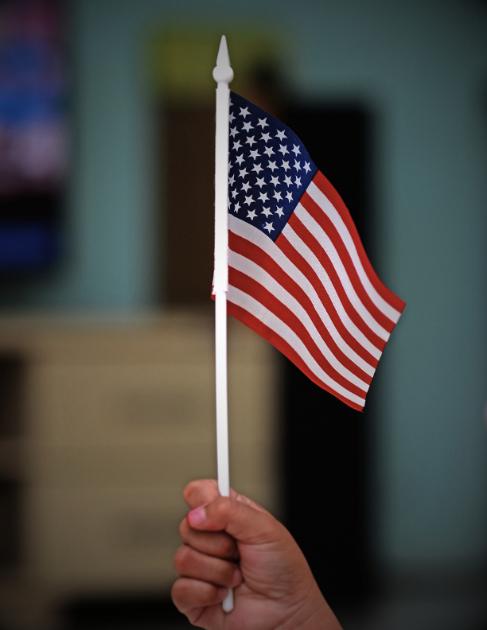

Gnats End
Jeff Clemmons
Darlene saw the jet's vapor trails streak across the vivid azure sky as tears rolled down her cheeks and gathered like small ponds of sorrow at the base of her head, which was cratered in the bloody soil of the garden behind her house.
Her momma had told her to leave those boys alone. That they were nothing but trouble; evil bred amongst the kudzu and ignorance that swallows up Gnats End.
But what do moms know. And it was Darlene who had begged them over.
Jeff Clemmons is a cofounder of M’ville, an Atlanta-based writing salon. In addition to writing two books – Rich’s: A Southern Institution and Atlanta’s Historic Westview Cemetery – and a screenplay, he, along with three others, was nominated for an Emmy Award for producing Georgia Public Television’s “Rich’s Remembered.” He is currently working on a biography of avant-garde novelist Frances Newman.


WolvesAt The Door
LaVern Spencer McCarthy
Years-of-poverty-ago, a wolf devoured our last chicken. Crouched in a swath of blood and feathers, fangs bared, it defied us.
Galvanized, we bolted from the woods screeched "Murder!" all the way home.
Mama stood at the cabin door wiping her hands on a flour sack apron, sharing our terror. The chicken had been planned for dinner.
I remember former chickens whose necks Mama had wrung, her upper lip turned downward like a beak, something reeling in her eyes as a scrawny meal raced its life away, out in the yard.
Before, I had managed to separate the violence from my plate of drumsticks and gravy, but not that night of no meat.
Shoving in collards that had not been forced to suffer on my behalf, I watched Mama brush a tear away as she tried to instill in us courage to face the wolves of our days.
LaVern Spencer McCarthy has published twelve books of short stories and poetry and two journals. She has won over five hundred state awards for her poetry and thirty-four national awards. She is a life member of Poetry Society of Texas She resides in Blair Oklahoma.

Best I Never Had
J. B. Hogan
You were better than the first one, though there was no complaint, better than those that followed though they were hard to find, better than the presumed one though it really couldn’t last better than all the near ones though they never came close better than all the painful rest though there had been no chance still you were better than them all, you were the best I never had.
J. B. Hogan has been published in a number of journals including the Blue Lake Review, Crack the Spine, Copperfield Review, Lothlorien Poetry Journal, Well Read Magazine, and Aphelion. His eleven books include Bar Harbor, Mexican Skies, Living Behind Time, Losing Cotton, and The Apostate. On June 14, he will be the 2025 inductee into the Arkansas Writers Hall of Fame. He lives in Fayetteville, Arkansas.

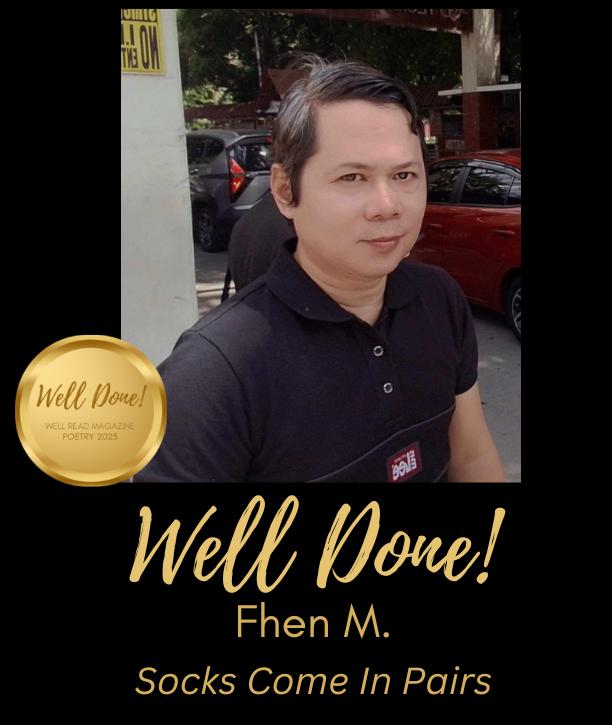
Socks Come In Pairs
Fhen M.
Awhite-bellied robin, active during the daytime, forages for food, and at night, the bird sleeps.
It's like a Goldilocks planet, with a perfect balance of day and night a night-shift worker feels drained of energy once daylight breaks.
Like a man who has spirit and body, with the loss of his physical vigor, the spark of life within him dwindles.
Amidst the chaos, life has a rhythm; nature has time for waking and sleeping. Time to put on shoes, and store them away.
When we lose a sock, when we lose sleep, when we defy nature's rhythm, something is lost to us forever.
Fhen M. often returns to the Pagsubay journals edited by David Genotiva, finding particular resonance in Edith Tiempo's entry "Resounding Contemporary Poetic Articulation." A specific line from Tiempo's writing deeply resonates with him: her assertion that "the image being posited against the statement is really saying that the basis of poetry is metaphor." This notion seems to strike a chord with Fhen M., as he frequently revisits and reflects on its significance.

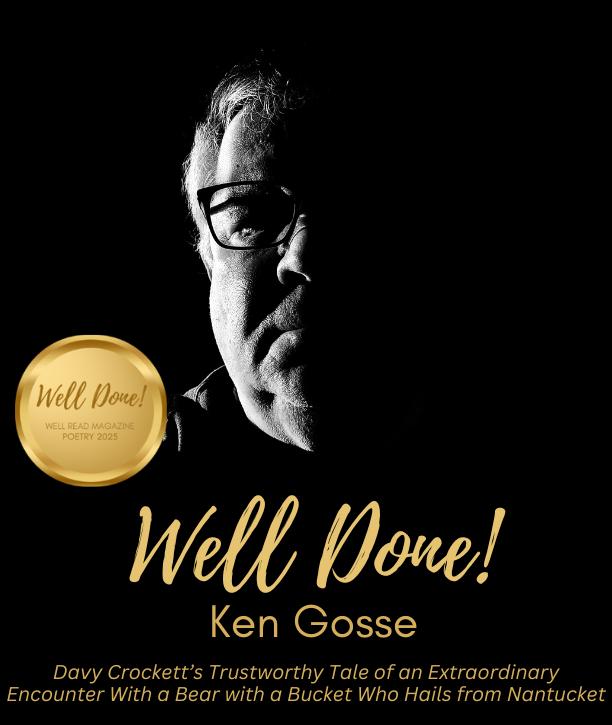
Davy Crockett’s Trustworthy Tale of an Extraordinary Encounter With a Bear with a Bucket Who Hails from Nantucket
Ken Gosse
From the Horse’s Mouth:
“This testament, written both faithful and true by the great-great-great grandson of someone who knew an acquaintance who heard the renowned raconteur humbly telling his story (sans hint of grandeur). His birthplace, a bend in the Old Nolichucky— “The King of the Wild Frontier” from Kentucky.
The soldier, frontiersman, and statesman avowed to the rabid attention of those in the crowd at the inn where they gathered to listen and drink, so attentive that not even one dared to blink at this one-hundredth telling of such a wild tale that it’s not been surpassed by the captain’s white whale.
His story:
Astare brought a bear to its knees while the woodsman stood still, just as calm as you please. This testament is, as I started to say, an authentic account of his words on that day with two verses appended, which seemed to be needed because, as you’ll see, it was never completed.” [The author’s unknown and the date isn’t clear, besmudged by drunk fingers which read it each year.]
Where the Legend Began: It was back by the old Nolichucky where I met a huge bear who was plucky. I froze with a stare till he wandered from there, and I reckoned that I was quite lucky. How the Legend Took Root: They say that I spoke to the bear. To be honest, I don’t really care.
What crazy suggestions— don’t ask a bear questions! That’s not how I got out of there. How the Legend Grew: While wand’ring our western frontier, I heard more of my story each year— the tale of a b’ar who had wandered so far from the Nantucket home he held dear.
How the Legend was Preserved:
Once I gathered each piece that I could, I decided time spent would be good in rehearsing the tale— they’re a great trade for ale! Here it is, far as I’ve understood:
The Bucket’s Gist:
There once was a bear with a bucket who wintered outside of Nantucket. The lair was quite bare
but a bucket was there and a blanket, beneath which he’d tuck it.
An Innocent Beginning:
The bear took a nap on a hill, where he frightened some poor Jack and Jill. ’Twas not his intent, but downhill they both went, and the bucket would need a refill.
Davy Sings the Blues: Jack and Jill went up the hill to fetch a pail of water. Abear was there and scared the pair! They lost the pail Jack bought her.
The Best Laid Plan of Bear and Man:
Abucket and bear but no plan (and no palindrome—search all you can).
“But what good would it do?”
“Why, of course! Hunter stew.”
So he took it back home to his clan.
Strange Encounters of the Frontier Kind:
While heading back home from Kentuck, the bear worried he’d run outta luck and meet Davy there who would give him “The Stare!” then he’d say, “That’s a pail, ain’t it, Huck?”
The Way to a Bear’s Heart:
So this big dumb ol’bear with a pail came up with an int’resting tale
’bout a man from Nantucket who’d just filled the bucket. Nice snack with a chaser of ale.
ARumor Can Outrun a Bear:
“There once was a man from Kentucket who stared down a b’ar with a bucket. Dave said to him, ‘Smokey, perhaps this sounds lokey: Did you eat a man from Nantucket?’”
Chug-a-Lug, Chug-a-Lug:
That’s where his narration suspended— a tad short of where he intended. Each verse meant a slug must be shared from a jug till the speaker and fans were upended.
What Happened Next:
Though the answer, delectably gory, became part of the bear’s repertory, the great storyteller Dave Crockett, fine feller, ne’er told us the rest of the story.
Ken Gosse usually writes metric, rhymed verse with whimsy and humor. First published in First Literary Review–East in November 2016, since then in Lothlorien Poetry Journal, Pure Slush, Home Planet News Online, WELL READ Magazine, and others. Raised in the Chicago suburbs, now retired, he and his wife have lived in Mesa, AZ, over twenty-five years with rescue cats and dogs underfoot.

HELLO
WRITERS &ARTISTS
CALLFOR SUBMISSIONS IS OPEN!
*No prompts or themes - no boundaries*
WELL READ is looking for submissions from writers and artists who have stories to tell – through words and art. We combine new and established voices from diverse backgrounds and celebrate different perspectives. We want people who aren’t afraid to shake things up, speak their mind, and share their humanity.
Click here for SUBMISSION GUIDELINES



CLAIRE CONSIDERS
Girls by Susan Wiggs
Wayward
“Wayward Girls”
by Susan Wiggs
Reviewed by Claire Hamner Matturro
“Wayward Girls” (William Morrow, 2025) by Susan Wiggs is a cautionary tale filled with memorable characters, offering suspense, drama, and redemption within its 400 pages. An important book, Wayward Girls also sweeps readers intoAmerican history and music from the ’60s to the present. While the first third can be harsh to read, the generally positive tones in the later parts are uplifting and rewarding. I am glad I read it, and I recommend it. Themes of shared trauma, powerlessness, transcendence, abiding friendships, recovery, and “I can do hard things” resonate throughout the novel.
Before I expand on any of this, let me add the trigger warnings: If you are a Catholic, this might be a tough read. It deals with the historically documented abuse of teen girls and young women in the so-called Magdalene Laundries run by nuns. In this novel, the facility at issue is “The Good Shepard Institute.” With a singular exception, the nuns running the place are pure evil in this novel. They are abusive, cruel, and embezzling funds from the church diocese. The Catholic Church as a whole is not well presented in the novel, though the worst of the condemnation centers on the nuns. Additionally, let me add a trigger warning about the abuses. At the Good Shepard, the girls are emotionally abused, physically
abused (including what I would consider torture), and some are sexually abused.
As detailed in the author’s notes at the end of the novel, the facility in this book was real, and the abuses were real. However, the characters are fictional. In her author’s notes, Susan Wiggs mentions her research, including interviews with inmates fromThe Good Shepard, and provides information on the true history of these abusive places for so-called wayward girls run by the Catholic Church. In some cases, the only “wayward” behavior of the girls was that they were born into poverty.
In essence, the Magdalene Laundries were institutions where enslaved and abused girls and teens (usually from poor backgrounds) were forced to do the harsh, uncompensated work of cleaning and pressing dirty laundry from hotels and other places. To quote the novel: “Brutal punishment, harsh rules, and iron discipline mangled the very souls” of the girls in such places. In the novel, one girl had been strapped “so hard that the fabric of her smock had made an impression in her flesh.”
The strengths of Wiggs’“Wayward Girls” are many—including its accurate depiction of the Magdalene Laundries, the cultural backdrop that captures the flavor of the ’60s and ’70s, the ultimately hopeful plot arcs, and the compelling characters of the girls themselves. The negatives are few—the author’s tendency to rush through large segments of the plot in a narrative that reads more like a synopsis, and an occasional indulgence in clichéd phrases (“his eyes seemed haunted by the shadows of war,” for
example). But my guess is that readers won’t mind a bit when they are caught up—as I quickly was—in the story of the main character, Mairin, and the other girls at the so-called school for wayward girls.
Mairin is a strong and spirited red-haired teen sent to The Good Shepard when her stepfather tries to molest her. Rather than protect her daughter, the mother capitulates to her husband and sends her daughter off to The Good Shepard. Mairin is immediately determined to run away from the horrid place and makes a failed attempt at escape right away. When she fails and is brutally punished, she begins to understand just how cruel the place is. Next time, she resolves, she will plan better. And there will be a next time.
While imprisoned there for a year, Mairin forms strong friendships with other girls. Their friendships sustain them, and their hopes for a better future help them persevere in the face of horrid conditions. Plus, their plans for a more organized escape keep them strong.The bonds formed in that wretched place survive beyondThe Good Shepard.At a future time, Mairin and her friends meet up again as they champion and support each other—and seek belated justice.The latter parts of the book detail Mairin’s life after The Good Shepard and her eventual reconnection with her other friends from the place.
There are several relatively new novels out now with the phrase “wayward girls” in their titles. In fact, an imprint of HarperCollins, the overall publisher of Susan Wiggs’“Wayward Girls,” also has a
book called “The Home for Wayward Girls” (Harper Paperback, 2023) by Marcia Bradley. And, full disclosure, a dear friend— Penny Koepsel—and I also authored a book titled “Wayward Girls” (Red Adept Publishing, 2021). Wiggs’ novel sets the laundry school in the late ’60s, Penny’s and my novel sets the abusive boarding school in the early ’70s, and Bradley sets her boarding ranch in the 1990s.
Although ultimately different, each of these “Wayward Girls” novels shares some things in common—including a red-haired protagonist. In each novel, teen girls are sent against their will to a dangerous facility for alleged delinquent girls, such as the school in Wiggs’ book or the remote boarding school or ranch in the others. There, the girls are abused. In order to survive, they form strong friendships and attempt to escape what are essentially unregulated prisons. When they try to report the abuses, no one believes them. Once they escape (one way or another), most overcome the shared trauma and manage to build good lives as adults—even though they remain haunted in some ways by the abuses they suffered. But not all recover, as some are irreparably damaged by their ordeal.
The ranch in Bradley’s novel, like the place in Wiggs’ book, claims to be a religious institution. In the book Penny and I wrote, the boarding school was dominated by men with ulterior motives, who nonetheless assured parents that if they sent the school their wayward girls, the school would send them home as ladies. Similar promises were made in the other books—all of them lies to cover
up the abuses.
The messages, then, of these Wayward Girls novels, as well as The Home for Wayward Girls, are that regardless of religious or other claims, such facilities for so-called troubled teens need to be carefully regulated. Further, teens in these places should be listened to carefully when they complain of abuse. Parents should thoroughly investigate any of the adults or institutions entrusted with the care of their teens. In addition to these cautionary themes, these books also address the lifelong trauma that impacts girls subjected to such abuse, their need for counseling, and the abiding strength of friendships.

Susan Wiggs is the award-winning, New York Times best-selling author of many novels, including romance and historical fiction.A Harvard graduate, she lives in Puget Sound.
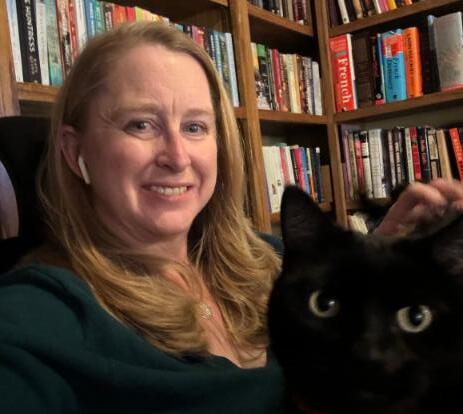
“…there is nothing more miserable than comparing ourselves to others.”
Annie Mondesir asks Aimie K. Runyan
What is your idea of perfect happiness?
Acold day, a good cup of proper French hot cocoa, a fuzzy blanket, an amazing book, and my cat purring on my lap.
What is the trait you most deplore in yourself?
Self doubt! It’s such a soul-draining waste of time and energy.
What is the trait you most deplore in others.
Lack of integrity. Be honest in your dealings with others! Not everything in life needs to be about getting ahead.
What is your greatest extravagance?
Five weeks in the summer where I am free to travel. I often bring work along, but I have gotten to see some amazing places.
What is the quality you most like in a woman?
Courage to stand up against a society that tries to make her smaller than she is.
Which words or phrases do you most overuse?
Obviously, absolutely, of course…
What or who is the greatest love of your life?
My darling husband Jeremy.. and books.
Which talent would you most like to have?
Instant, perfect recall of everything I read.
What do you consider your greatest achievement?
My kids and my 12 (and counting!) published works.
If you were to die and come back as a person or a thing, what would it be?
My own cat. I want to know what that level of spoiled feels like.
Where would you most like to live?
Aside from Estes Park, where I already have the privilege of living, either Provence or Ireland.
What do you regard as the lowest depth of misery?
Jealousy…there is nothing more miserable than comparing ourselves to others.
What is your favorite occupation?
Author… what a fortunate coincidence! If I had to pick another, it would be university professor, so I married one of those.
What do you most value in your friends?
Warmth and humor! A funny (preferably inappropriate) meme goes a long way.
What is your greatest regret?
Not having the courage to start writing seriously sooner.
Aimie K. Runyan writes to celebrate history’s unsung heroines and the spirit of strong women of any era. She has been honored as a Historical Novel Society Editors’ Choice selection, as a five-time finalist for the Colorado Book Awards, and as a nominee for the Rocky Mountain Fiction Writer of theYear. Both of her 2024 titles have been long listed for the Reading the WestAward in Fiction.
Aimie is active as an educator and speaker in the writing community and beyond, and is an adjunct professor for the Drexel University MFA in Creative Writing Program. She is a proud member of the Tall Poppy Writers. She lives in Colorado with her amazing husband, two (usually) adorable children, two (always) adorable kitties, and a dragon.
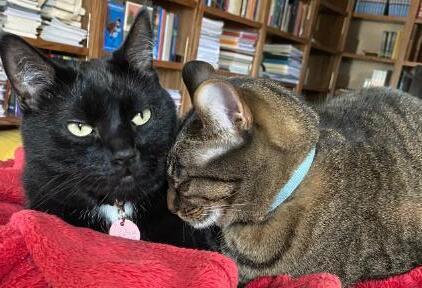
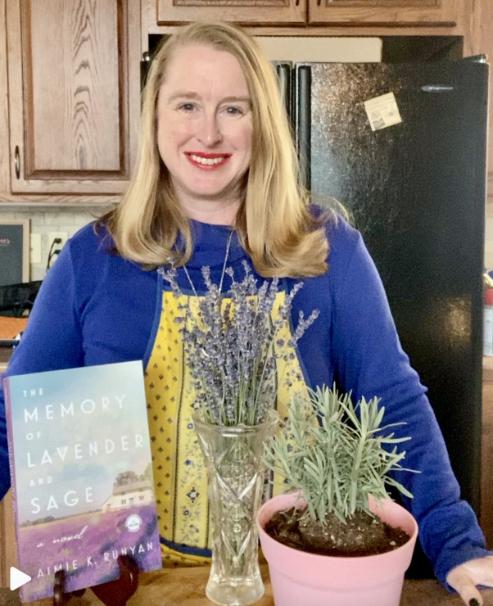
“Aimie K. Runyan has knocked me out with The Wandering Season, a lyrical book about a young woman's modern-day quest to find out who she really is and how to fulfill her creative dreams. Rich with exquisite descriptions of food, family, international travel, as well as fully believable instances of magical realism, this book has everything I love in a story. Brilliantly written, Veronica's journey will stay with me for a very long time.”
~Maddie Dawson, bestselling author of Let's Pretend This Will Work
The Wandering Season:ANovel
Aimie K. Runyan

Finding Inspiration in Unexpected Places
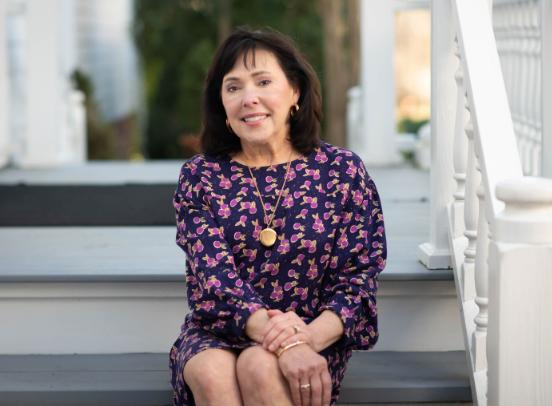
THE WRITER’S EYE
with Susan Beckham Zurenda and guest author, Scott Gould
Against Inspiration
This month Scott Gould writes about idea versus inspiration. Scott is an extraordinary author who has gathered such awards as the Eric Hoffer Award for Fiction, a Next Generation Indie Book Award, IPPYAward for Fiction, and the Larry Brown Short Story Award. His novel Peace Like a River comes out this month, and I very much look forward to reading it. From the jacket copy: “A captivating exploration of forgiveness, redemption, and the enduring bonds of family, Peace Like a River invites readers into a world where love and loss intersect with the healing power of nature and introspection.”
I got to know Scott when I took a creative writing class he taught at the South Carolina Governor’s School for theArts&Humanities many summers ago. I can attest he’s as good a teacher as he is a writer. I hope you enjoy his take on inspiration. I surely did:
I might as well just throw it out there…I believe inspiration is highly overrated. At the very least, it’s overvalued. Probably misused. Definitely misunderstood. If I had to point a finger at somebody, I’d blame the ancient Greeks. They were the ones who concocted that whole Muses scenario, nine goddesses who existed to spark creativity. They (whoever “they” is) even assigned three of the goddesses to poetry, so the art of writing got more than its fair share of inspiration-adjacent mythological creatures. The
ancient Greeks convinced us that inspiration was something to be delivered, something we should desire…and wait for. And therein lies the problem: if you wait for a Muse to whisper in your ear, you’re going to spend a lot of your time not writing.
Part of the problem, I think, is confusing inspiration with having an idea. Ideas are as plentiful as tap water. If you’re a writer, you should be able to walk three blocks down any street and come up with a half dozen ideas for a story or a poem or an essay. That’s the job of a writer: to keep the eyes and ears open and notice the small things that other folks (the non-writers) simply miss or ignore. The snatch of dialogue from the waitress at Waffle House. The skinny, sweaty guy preaching on the corner of Main and Coffee Street.The crumpled envelope that someone accidentally dropped on the sidewalk. Those are all potential ideas for a piece of writing. They aren’t necessarily inspirational. They are starting points, tiny bits of the world to be mulled and fermented and ultimately woven into a story.
For over twenty years, I taught creative writing at the SC Governor’s School for the Arts and Humanities. Each winter, my colleagues and I interviewed potential students. One of our standard questions was, “How often do you write?” Seven out of ten times, the answer would be, “I write when I’m inspired.” (Spoiler alert: that’s the wrong answer.) I remember asking this follow-up question so many times: “Well, you’re going to have to write every day if you go to school here, so what happens on the days when you’re not inspired?”
You see, writing is a blue-collar gig. You must get your butt in the chair and do the work. But here’s the wonderful thing…When you’re doing the work, when you’re sitting in the chair, sculpting your idea, that is when inspiration might come calling. You have a main character, and you suddenly realize he should have a limp because of a hunting accident twenty years ago. (Inspiration.) Out of nowhere, your protagonist develops a strange tick; she begins mispronouncing her children’s names. (Inspiration.)You bring in a secondary character who blows smoke rings in the shape of a heart. (Inspiration.) Inspiration is the by-product of doing the work. It can make a good idea better.
I have a new novel that started with an idea, not with an inspired moment. I had the idea to take the protagonist from an older book—a linked collection of stories set in the 1970s (Strangers to Temptation, Hub City Press, 2017)—and age him fifty years to see how he’d changed (or how the world had changed him.) The result is Peace Like a River (Regal House Publishing). When I sat down to work on this idea, interesting things began happening. Was the dead grandfather’s artificial hip joint an inspired detail? Maybe. Was the laid-back, feral cat named Willie Nelson inspired? Could be. Do I think a Muse snuck in the front door and tickled my ear? Not a chance. Writing is not magic. It’s a job. It’s hard work. And if you work hard, good (perhaps inspired) things happen. My suggestion? Don’t bide your time waiting on inspiration. Spend it working on a good idea. The inspiration will take care of itself.
Peace Like a River is an examination of different shades of love—young love, comfortable love, love gone bad, love still undiscovered. It’s a story of how the past breathes life into the present…and vice versa. And ultimately, Gould’s Peace Like a River is about coming of age and dealing with age, about finding your ghosts and facing them down.





Here are two great opportunities to meet author, Michael Spake!
Michael Spake: Reading and Signing | Hub City Writers Project
Hub City Book Shop
Date & Time: August 12th 2025 | 6:00 PM - 7:00 PM
Address: 186 W Main St., Spartanburg, South Carolina 29306
Pat Conroy Literary Center Open Mic Night
Pat Conroy Literary Center
Date & Time: August 14th 2025 | 6:00 PM - 7:30 PM
Address: 601 Bladen St, Beaufort, SC 29902


2-year/60-hour Program
Study One-on-One withAward-Winning Writers
Online Courses
Learn from Home
3 Writing Residencies
3 Entry Points to Start in the Program
Beautiful Rural Campus Nestled in the Etowah Valley (550+ acres)
Nestled in the shadow of Pine Log Mountain for the perfect writing experience, the Etowah Valley is a bridge betweenAtlanta and theAppalachian South, where nature meets culture.
At Reinhardt University’s Etowah Valley Master of Fine Arts (MFA) Low-Residency Program writers create a literature that is story-driven and grounded in the places where we live, whether rural or urban.
Each summer, students visit our beautiful campus in North Georgia for a 10-day intensive residency to be immersed in writing daily writing workshops, craft classes, experiential excursions into natural and urban environments, and nightly readings on campus from our visiting writers.
Our students travel from all over the United States to attend the summer residency to learn from some of the finest writers. In doing so, they embody a unique mixture of cultural traditions and lifestyles.Amid the thrivingAtlanta film scene and Southern environmentalism, we believe in the art of storytelling that develops voice and meaning to the individual artist.
For more information, visit the MFA website or contact the MFA director, William Walsh, at bjw@reinhardt.edu
Core Faculty:
Anjali Enjeti
(creative non-fiction/fiction)
Southbound: Essays on Identity, Inheritance, and Social Change
The Parted Earth
Jessica Handler (creative non-fiction/fiction) The Magnetic Girl Invisible Sisters
Soniah Kamal (fiction)
An Isolated Incident Unmarriageable
Donna Coffey Little (poetry/fiction) Fire Street
Wofford’s Blood
Michael Lucker (screenwriting)
Crash! Boom! Bang! How to Write Action Movies Rule One
Past Visiting Writers:
Laura Newbern (poetry)
Love and the Eye
A Night in the Country
Gray Stewart (fiction) Haylow
Megan Volpert (poetry/creative non-fiction)
Why Alanis Morissette Matters Boss Broad
William Walsh (poetry/fiction)
Haircuts for the Dead Fly Fishing in Times Square
John Williams (fiction/creative non-fiction)
End Times Monroeville and the Stage Production of To Kill a Mockingbird
Adrian Blevins, Daniel Black, David Bottoms, Richard Blanco, Earl Braggs, Jericho Brown, Annemarie Ni Churreáin, Denise Duhamel, Stephen Dunn, Pam Durban, Alice Friman, Anthony Grooms, Beth Gylys, Ann Hite, Kristie Robin Johnson, Andrea Jurjević, John Lane, Ellen Malphrus, Reginald McKnight, Christopher Noel, Robert Olmstead, Janisse Ray, Megan Sexton, George Singleton, Sharon Strange, Chika Unigwe, Monica Lee Weatherly
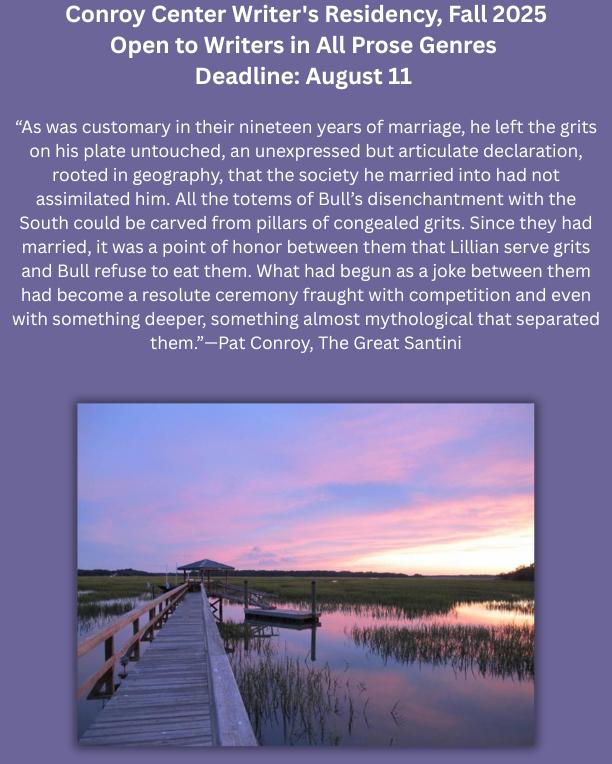
WELCOME TO MARSHSONG COTTAGE
Coinciding with the annual Pat Conroy Literary Festival, the nonprofit Pat Conroy Literary Center will offer our ninth Conroy Center Writer's Residency this coming fall, available to writers of all prose genres. Located on a salt marsh, the residency at MarshSong Cottage provides an inspirational, creative space in the heart of Pat Conroy’s beloved lowcountry.The residency location is a guest cottage on St. Helena Island, South Carolina, approximately 15 minutes from downtown Beaufort and 15 minutes from the beach at Hunting Island State Park.
The residency dates will be October 22 to 29, 2025, overlapping with the 10th annual Pat Conroy Literary Festival, which the selected writer will be invited to attend.
TOAPPLY FOR THE WRITER'S RESIDENCY
Please submit the following by August 11, 2025, to contact@patconroyliterarycenter.org with the subject line CONROY CENTER WRITER'S RESIDENCY:
1) Grits or no grits? Are you Team Lillian or Team Bull? In 300 words or less—and in any form of writing you choose, tell us about your relationship with grits. Love them? Hate them? Have a favorite recipe or grits-flavored story?
2) Ceremony and mythology: Tell us about something of grand importance to your family or circle of friends which was treated as a kind of ceremony or mythology unique to your experiences. Got a tradition,
custom, ritual, or habit that is idiosyncratic? Do tell—in 300 words or less and in any form of writing you choose.
3) Who are you? Send us a short bio, along with your contact information, up to 100 words, in first person prose please.
4) Do you have a favorite Pat Conroy book? If so, tell us which one, and why. Don’t have a favorite Conroy book? Then tell us which book by another author is closest to your heart and why in about 50 words.
5) How did you learn about this residency? Short answers welcome!
6) Finally, let’s have a look. Include a writing sample of your work, 3 –5 double-spaced pages of prose in 12 ptTimes New Roman or similar font. Attached to your email as PDF, please!
Completing all sections of the application as directed is essential. Incomplete applications will not be considered for the residency. Submissions will be reviewed by a panel of Conroy Center advisors. The selected writer will be notified by September 1.
The residency is open to both published and unpublished writers. If you have applied before but not been selected, we encourage you to apply again. Pat Conroy was a mentor to writers in all stages of their careers and we wish to honor that legacy.
ABOUT THE COTTAGE
Learn more about MarshSong Cottage here. The selected writer must provide her or his own transportation. Residency is for the writer only; no guests or pets.


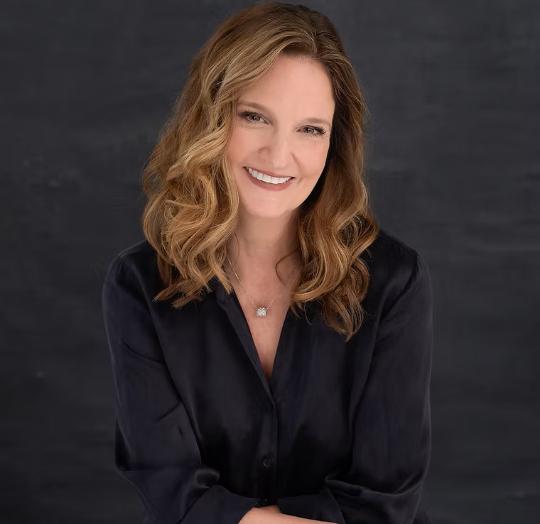
Behind-the-Scenes of Needle
and Bone
Tonya Mitchell
Behind-the-Scenes of Needle and Bone: a dark historical novel about magic, medicine, and murder
As a writer, I’m always looking for my next book topic. As a writer of gothic historical fiction, I’m searching for something sufficiently dark and murky, with enough promise to hold a story in it.
When I landed on Cristin O’Keefe Aptowicz’s Dr. Mütter’s Marvels, I knew I’d found my next book idea (really more of an obsession as these things go, because since I know I’ll be writing about a particular subject for a good year, I need to be fully invested to keep my interest up and stay rooted in the story).
Cristin’s book is nonfiction that reads like a novel—always a good sign. The doctor at the center of her book, Dr. Thomas Mütter, was a pioneer in surgery. But not just any surgery. His specialty was what French surgeons were calling la chirurgie plastique (plastic surgery) and he was one of the first in the United States to do it. What I found so fascinating was that plastic surgery at the time—the 1840s—wasn’t about methods to enhance beauty; it was about restoring patients to some level of normalcy.
That’s because Dr. Mütter’s patients were considered ‘monsters.’ They were disfigured. They were strange. The kind of people
who wouldn’t have been accepted in polite society, who would have been ridiculed or shamed, and quite possibly ostracized. Mütter would spend his career fixing them, in what he described as ‘the difficult domain of reparitive or reconstructive surgery.’
What kind of surgeries did Mütter do? Some of his most common procédures were to repair birth defects like club foot or cleft palate. He performed surgery on victims of fire with burns so horrific, the scarring rendered them almost unrecognizable. Others suffered from tumors or other growths he cut from the face, neck, or limbs.
Mütter worked at the Jefferson Medical College of Philadelphia, one of the first medical schools in the country. At just 30 years of age, he was the youngest doctor to hold a chair position—the esteemed Chair of Surgery. He’d only been practicing medicine for ten years at the time of his appointment which he would occupy until his death.
His Jefferson contemporaries were some of the brightest physicians in their respective disciplines, including obstetrics, anatomy, and materia medica (pharmacology). He was a master lecturer, loved teaching, and worked hard to destigmatize deformities and physical aberrations.
The success of these surgeries was all the more remarkable when compound fractures were only 50% survivable, and germ theory and anesthesia didn’t yet exist (a shot or two of grain alcohol was about all doctors provided patients to numb pain until ether became available in the mid-1840s!).
One of Mütter’s greatest achievements in his short life (he only lived to 48 years of age) was the collection of over 2,000 medical specimens which ranged from the organic in wet or dry form (bones and organs), to models rendered in wood, wax, and paper mache. Most have survived. Many can still be viewed at the Mütter Museum in Philadelphia. It’s one of the most educational (and weird) glimpses into early medical history in the United States.
After reading about Dr. Mütter and his good friend, Dr. Joseph Pancoast (who worked closely with him as Chair of Anatomy at Jefferson College), I knew when and where I wanted the book to take place. The gothic elements of corpses, body parts floating in jars, surgery in the round and more were all there, baked into the era. But was this a thriller or a mystery? What was the plot? Answering these questions was a matter of asking a series of ‘what ifs’ until the bones of the story began to take shape (pun not intended).
Cristin’s book was full of illustrations of Mütter’s surgical work (photography wasn’t prevalent quite yet). These images turned out to be a big source of inspiration for me. Littered through the pages were renderings of patients on whom Mütter operated, showing first their abnormality, then the various incisions, tissue removal, and stitch lines post surgery that ultimately reconstructed or restored patients’ appearances. I wondered who’d drawn them. Unfortunately, the artist’s name hasn’t survived. While he was almost certainly a man, I decided Mütter’s illustrator would be a young woman. My main character,Annis Hargrave, was born.
Now that I’d settled this, I quickly added a backstory steeped in murder (as so many gothics are), and a villain with a penchant for revenge. Magic shows were all the rage in the 19th century, so I decided to make the villain a magician guarding more than the secrets of his magic tricks.
My third fictional character would be based loosely on a patient Cristin described in Marvels who’d undergone surgery before a packed surgical ampitheater. Nathaniel was his name and Mütter had performed surgery to close the roof of his mouth and upper lip due to being born with cleft palate. It was a surprise to me that Nathaniel became Annis’ love interest (these happy accidents are always a boon). I had the foundation of the story now, I justed needed to do more research and round out smaller details and subplots.
Part of that research was touring the Mütter Museum in Philadelphia where Mütter’s marvels are still viewable behind glass. They’re creepy, yes, but they also show the lengths he went to in order to understand the human condition. Mütter by no means collected and showcased these specimens (tumors, twisted limbs, waxworks of various deformities, etc.) to exploit the victims, but to lay them bear. To show that a bone was just a bone, an abcess no more or less that that, and that these abnormalities could be understood and remedied, and the lives of patients much improved with medical intervention.
Into this somewhat creepy college comes seventeen-year-old Annis with a past she’s desperate to keep buried. Her goal? To start
a new life. But something’s holding her back: a ghost. The paranormal was something I never explored in my first two books, but it seemed perfect for this one. Is she as creepy as Mütter’s specimens? Yes. But like so much of Needle and Bone, things aren’t always what they seem.
Tonya Mitchell is the author of The Arsenic Eater’s Wife, an historical true crime Gothic mystery set in 1889 Liverpool. Her debut historical novel, A Feigned Madness, won the Reader Views Reviewers Choice Award and the Kops-Fetherling International Book Award for Best New Voice in Historical Fiction. She is a member of the Women Fiction Writers Association, the Historical Novel Society, and theAuthor’s Guild. She lives in the US with her husband, three boys, and an overweight golden doodle.


“This is re-imagined history at its best!”
Reader Review
Needle and Bone
Tonya Mitchell

John M. Williams interviews
William Walsh
William Walsh’s new novel, Haircuts for the Dead, published by Mercer University Press, will be released onAugust 5, 2025. The following interview with John M. Williams was conducted on June 2, 2025.
JW: Why don’t we start with a brief history of the novel’s composition?
WW: I began writing this novel in 1988. It started out as a comedic novel about a woman I was working with. I wrote about 300 pages. The main character was named Paula and was nothing like Hannah. I wrote the story for the wrong reason, but things morphed, and I ended up changing her name to Hannah because it’s a biblical name. I started developing the idea of who she was and why she was the way she was, and then I started eliminating things from the original story. I made Hannah younger by about six years, and then I just got this idea about the fall of man.
JW: What’s the significance of the biblical name?
WW: I had the idea that she wrote down a Bible verse on a piece of paper, and from there I started developing the idea that here’s a young woman who has lost her religion but not her spirituality. She
leaves the church and organized religion but she can’t leave the spirituality that’s inside of her. The book has a biblical sub theme.
JW: Would you say it’s a coming-of-age story?
WW: It is very much so for Hannah as a character because she starts out with this little rinky-dink job at the Cute Curl Salon. It’s a job that provides her economic freedom even though she is barely squeaking by. Traditionally, women have been economically dependent upon men. It’s not as true these days, of course, but it was up until the mid-1970s, even into the ‘80s. I gave her that job and then it just started developing—who she is, what she’s doing, why she’s doing things, the foundation for things to come. She thinks she’ll meet a man and get married, but of course, that apple cart gets completely tipped over because, at least in Hannah’s family’s life, pretty much the unthinkable happens: she falls in love with a black woman. Now you have this biracial lesbian relationship.
JW: You got it into an age where the relationship wouldn’t be that shocking.
WW: You’re absolutely right; society has, for the most part, grown up. I think the crux of the story now is Hannah coming of age by standing up to the bigoted, racist past of her family and the history that has permeated the family farm, and of course, losing
the farm is essentially being cast out of Eden even though her father gets all that money. That’s sort of the class of Hannah’s family—they’re uneducated racists, and there are some things they do that are good, but they still don’t like anyone who’s different than them.
JW: That makes me think of Darnell’s first wife. Is that a piece of poetic justice?
WW: Yeah, Melanie Carlyle. She’s very light skinned but she’s Black, which he didn’t realize when he married her. So here’s this racist who goes to meet her family for the first time—you talk about irony. And think about what he does his whole life: he doesn’t work, he doesn’t have a job because they will garnish his wages, and he doesn’t want anybody finding out that he married a Black woman, so you know he’s not a good person, yet out of the marriage to Lilith you have this wonderful young woman, Hannah, who’s just trying to make it on her own.
JW: I wanted to ask you about the time frame.You started on this a long time ago but the “now” of the book seems to be our now, 2024-2025. Did you push the time forward?
WW: I had to. It took so long to write. I mean, everything was so different in 1988 when I started. We didn’t have computers, email, cell phones with text messaging, all this stuff, so every time
I would rewrite the book or work on it, it might be three or four years later, then all of a sudden it’s 10 years or 15, and I kept updating it, and then in 2022-23 when the book was really close to being finished the way I wanted it, it took another year to fine tune it, to update things in the background.
JW: Let’s talk a little bit about point of view. You could have written the novel completely as the Document of Life in first person, but you chose to use third person, from Hannah’s point of view as well.
WW: What happened was, I wrote the original story in third person, and then when I rewrote it, I just started completely over in first person. I rewrote 300 pages in first person and then one day, years later, I re-read it and completely rewrote the whole novel back in third person. Six months later, after I was done, I’m going down the road and all of a sudden I just get this idea—No! It’s wrong. I rewrote the whole thing again in first person. But somewhere along the line I realized that Hannah couldn’t have knowledge of everything. I realized I needed to have this second narrator who was omniscient. So now I have this narrator telling the story and then the story gets interrupted with Hannah’s Document of Life, or if she has a thought for a Bible verse, all of which is inserted into her narration. And that all probably took 12 years (laughing).
JW: There are certainly many examples of situations Hannah couldn’t have been privy to. I’m thinking especially of Dave Edwards towards the end, manipulating things unknown to Hannah.
WW: In fact, that’s one of the last things I wrote because Dave Edwards is this mysterious character who if there’s a character that is closest to me personally, that would be Dave Edwards. He’s sort of her knight in shining armor that she doesn’t know is in the background pulling strings. Hannah cuts his hair every three weeks; he’s a nice guy but he has an ominous past, unknown to the reader, although the reader sort of figures out at the end that this guy has a way of getting things done. I hope it comes out that you realize who murdered Hawkshaw Bales.
JW: Maybe we could touch on that now, because you set it up that it’s Margaret—“don’t you worry about him, I’ll take care of him”—she’s got the gun and is an expert marksman. The cops seem to think it was her. I was wondering why you left it unresolved.
WW: I truly didn’t think I left it unresolved. I did not want Margaret to be the murderer even though Margaret has skills and she’s angry and she even says “I’ll take care of him”—but she’s not the one that kills Hawkshaw.The reader has to look carefully at the end. Truthfully, the most important legal aspect toward the end is
Hawkshaw Bales suing Hannah for paternity, and that leads to the motive for his murder.
JW:That was another question I had—his obsession with getting the child. But the rape is so violent—
WW: You want to know something about that? The brutality is in the description later of what happened, not in the physical act.
JW: Yes. To me, there are three really powerful scenes in the book: the opening scene of the baby and the burial; the second is the rape—the first time we hear of it it’s already happened; and the third is the murder of Hawkshaw. You dramatize neither that murder or the rape in the book.
WW: It’s not gratuitous. You want to know who taught me this? Harry Crews.
JW: Don’t show the violence?
WW:Yes. I was down at the University of Florida in Gainesville back in 1988 interviewing him. He was scary as hell, but he was incredibly nice. We talked about this very thing: He told me, “Understating something is more powerful than gratuitously describing it.” If you notice, that was true of the rape scene—not the baby scene but the rape scene. It is not seen but reported—so
everything that happens is happening in your mind. You’re imagining it and it makes it more powerful.
JW: Like Hemingway. Anything you know, you don’t have to say.
WW: Yes.
JW: I wanted to ask you about the Sarah story. Where did you get the idea for the diary of a pioneer woman, and what was your rationale for entwining it with the main narrative?
WW:There was a real diary that was found somewhere out west. This was back in the late 1980s. It’s a true story—these people found an old handwritten diary in the rafters or somewhere from a woman who left from somewhere back east. They got it published and I read it and thought, I’m going to make up my own. I created a storyline where this woman has a husband and three or four kids and is basically his property. It was her plight as a woman that he controlled everything. He controlled the purse strings and even when she wrote letters for people for a couple of pennies, he took the money. Her journey parallels Hannah because Hannah’s on her own hero’s journey. She’s enthralled with Sarah and her story and becomes empowered and inspired by Sarah. In Sarah, Hannah sees similarities to her life, but more so to her mother’s life. When Hannah reads about Sarah’s life, she wants her own life to be better
than the life her mother had. Hannah’s mother—Lilith—and Sarah are the same story, just one hundred and fifty years apart. Of course, that story is the antithesis of Hannah, who has options: she cuts hair to earn her own money; she’s scrappy; she’s trying to make extra money cutting hair at the funeral home; and what does she end up not having? What is it she doesn’t need in her life? A man. And it’s not by any conscious decision but then she simply falls in love with Margaret and so she doesn’t need a man in her life.
JW: Thinking about theme, I like the scenes when Hannah goes back to the farm because the older you get, the more loss becomes a theme of life, and she’s dealing with loss at a pretty early age: all of her past, everything she experienced as a child, was there, and the cutting down of the apple trees, that’s very symbolic.
WW: Yes, it’s just out of the Garden of Eden. What’s interesting is, part of the reason for cutting down the orchard and destroying the farm comes from David Bottoms because if you go to Canton to where the Kentucky Fried Chicken is, that’s exactly where David Bottoms’house was.Years ago when he grew up, it was just a one lane road, and now it’s four lanes or whatever, but across the street was his grandfather’s farm, the family general store, the dog lot, the horse run, everything right there and all that land was David’s grandfather’s, and sometime in the early 1980s, after his
grandfather died, it was all sold. Developers tore it down and built a Kmart. It’s all gone. Today, I go by there several times a week on the way to the university, and that’s sort of what’s happening in the novel.Although the farm isn’t completely buried under, it’s on the way. Hannah’s family farm was purchased for a new airport, but then they realized they didn’t have enough land—dumb mistake— and they sold it off. That part is based off a real event.
JW:You mentioned that Madison Jones read an early draft of the novel.
WW: Yes. By the time he read it, I was on my way to understanding the story and Hannah. Madison was quite wonderful in that he gave me some great insight. Like his novel A Buried Land and the Tennessee Valley Authority damming up the river and the two guys burying the woman under all that water, which is really kind of where Dickey gets his idea in Deliverance, it’s this whole idea of everything can be torn apart, torn down, rebuilt, and something is always lost. We bury everything and forget about it. This whole idea about a buried land resonated for me for all these years. He gave me the greatest advice when he said “I always have a character who is outside the law”— which, for me, is Hawkshaw Bales. I learned a lot from Madison.
JW: I believe you told me the opening chapter benefitted from the novel’s long period of gestation.
WW: Yes, the opening chapter is a powerful scene and one of those things that influences Hannah’s entire life. The reader begins to see how and why she is who she is. Chapter one was the last thing I wrote. I had undergone some reservation about the opening of the novel. I didn’t know what the problem was, but my instincts kept saying that something was amiss. I set the book down for nearly a year and simply thought about the story day after day. One day I was driving down Roswell Road with my mind not on the book. I was trying to survive Friday afternoon traffic. I was about three or four miles from my house when all of a sudden, BAM! I remembered the scene with the baby. It was a true story I had heard about an incident during the Depression. There was this family who couldn’t afford another baby to feed and when the baby was born, they held the baby up and dropped it on the floor and killed it and buried it in the cornfield. They knew where the baby was buried, but in Haircuts Hannah does not know and never finds the grave. She’s always searching for the baby and for things from the past. When I remembered this story about the baby, I knew it would explain everything about why Hannah is how she is. It’s an absolutely essential scene. I drove home and wrote the chapter in about three days and then published it as a short story, “The Fishing Trip,” in WELL READ Magazine. After that, I made more tweaks and turned it into chapter one. One of the most important things is at the very end of the story when Hannah’s talking about Sarah’s diary and Sarah traveling from Pennsylvania out west.This is when the reader discovers the real name of the baby, because it’s
what her mother whispers in Hannah’s ear—the baby’s name—and that brought everything full circle.What a burden on a six-year-old girl.

John M. Williams Author John M. Williams was named GeorgiaAuthor of the Year in 2003 for his novel Lake Moon, and has published a variety of stories, essays, and reviews through the years. His most recent books are Monroeville and the Stage Production of “To Kill a Mockingbird,” Atlanta Pop in the 50s, 60s, and 70s: The Magic of Bill Lowery, co-authored with Andy Lee White, and Village People: Sketches of Auburn. Williams retired from full-time teaching (LaGrange College) in 2015, and currently works as a mentor in the Reinhardt University Creative Writing MFA program. His and co-author Rheta Grimsley Johnson’s play Hiram: Becoming Hank, about the formative years of singer Hank Williams, enjoyed a successful run at the Monroeville,Alabama courthouse, opposite To Kill a Mockingbird, inApril 2021.
"Those fortunate enough to have read William Walsh's first novel, LAKEWOOD, know he is a vital voice in contemporary fiction. Now with HAIRCUTS FOR THE DEAD we can welcome a story addressing the most important concerns of our time: race, choice in sexual identity, the burdens of the past, and challenges to faith. Walsh portrays the elusive dynamics within families in this era of rapid change, as a story-within-astory illuminates each. You will be moved by this novel of the search for a home and love, to be found in unexpected places." --Robert Morgan, author of GAP CREEK
Haircuts for the Dead William Walsh




I’m an indie author of two short story collections – Walking the Wrong Way Home and Sharp as a Serpent’s Tooth – Eva and Other Stories, and a novella, Oliver. I’m the editor and designer of WELL READ Magazine’s Best of 2023, and Best of 2024 anthologies, the Encounters With Nature anthology, and coeditor of The Best of the Shortest: A Southern Writers Reading Reunion. I’m also a freelance writer for Amelia Islander Magazine, and the Editor in Chief and Publisher of WELL READ MAGAZINE.
I’ve learned so much about formatting, interior design, cover design, and self-publishing since my first short story collection came out and oddly enough, I’ve had fun doing it! But it can be frustrating and overwhelming trying to figure it all out on your own. I’d like to use what I’ve learned to help you.
Whether you’re thinking of self-publishing, querying agents or small presses, I can get your manuscript ready to send out without costing a fortune or waiting for months for a finished product.
Cover Design Pricing starts at $250 - Price include covers for both your print and ebook with unlimited tweaks until it’s perfect. See the next page for a few examples of covers I’ve created.
Interior design - $2 per page, $3 per page if photos or images are included
For more information, click here, or contact me at mandy@mandyhaynes. com for a free consultation.
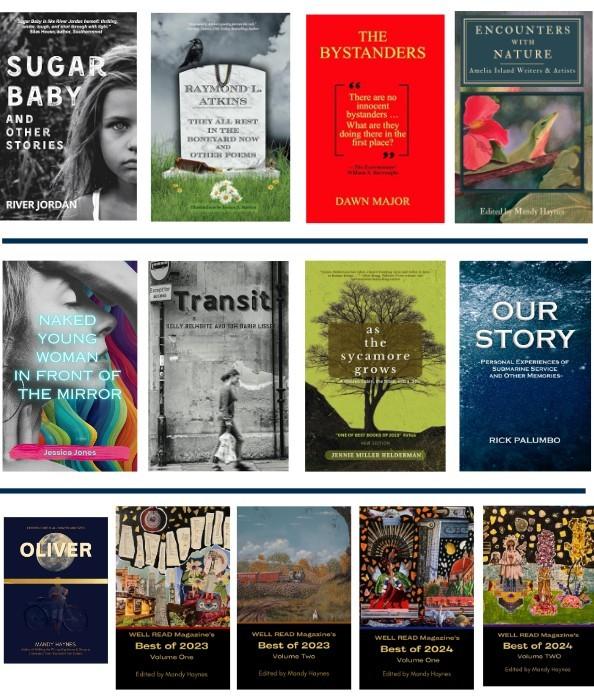
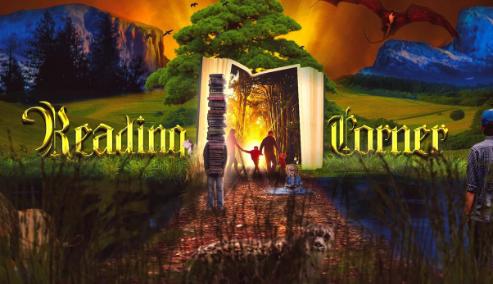











You come to the city because your passion called you here. Whatever that passion may be. That thing you love. And you wander out into the streets searching for a place to pull up a stool, order a drink, chat with the bartender about all things divine.
Welcome to God On The Rocks. Serving up great drinks and soulful conversations since time began.





I’m looking for Authors Interviewing Authors and would love to shine a spotlight on your favorite Independent Bookstores, Book Sellers, Libraries, and Librarians.
These pages are a great way to let readers know who you are and they are FREE.
Send orders for ads, interviews, or the stories mentioned above, as well as any questions about the magazine to:
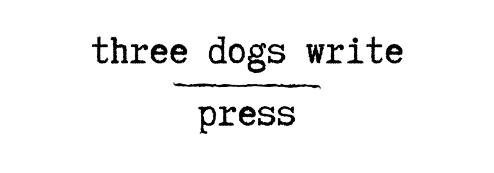

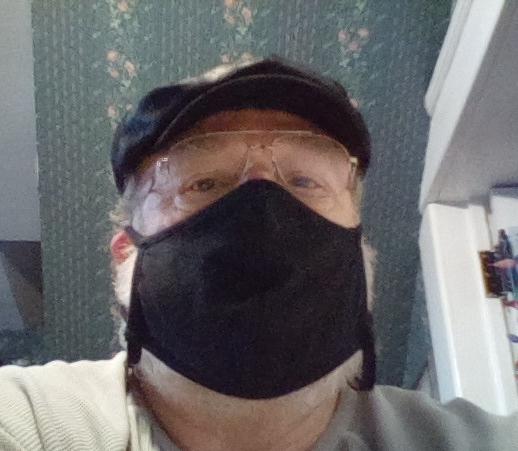
A monthly column that takes us off the page and into the
Behind the Mask
You can never really tell what will become the next cultural phenomenon. Sometimes a little thing that no one gave much thought to will just sneak up, and before you realize what has happened, it has become a big deal. A few examples are hula hoops, fins on the back of sedans, and Pop Tarts. I never really liked hula hoops, probably because I couldn’t hula properly, and Pop Tarts have always sort of tasted like strawberry cardboard to me. Fins, on the other hand, were way awesome, and provided that at least one automaker survives the Trump Fiasco, I hope to see them back some day.
Here in these waning days of the Great American Experiment, the wearing of masks has emerged as the latest in a long line of defining actions that divide us into two groups: us and them. I am going to take a few moments to discuss the history of maskwearing in this country, and then to speculate about who wears what and why they do. I must warn you ahead of time that this is what they call a hot-button issue, although why that is the case is well and truly beyond me, so if you are the excitable type, please just skip this. You will be happier, I will be happier, and Mandy will be happier. Keeping her happy is my main goal in life.
For most of my life, the wearing of masks was not the divisive issue it is today. The exception to this general rule pertains to members of the Ku Klux Klan, about which we will talk presently. Kids wore them at Halloween because it was fun to go out and be rewarded with candy while pretending to be someone else, and even though I was a poor kid and never got to have that Green Lantern mask that I desperately wanted, I still did pretty well as a ghost, which was what I had to be year after year, because we already had a sheet with holes in it, and who needed a damn Green Lantern mask anyway? Sorry. It still hurts.
Surgeons and nurses have always worn masks in operating rooms, and still do, because it was and is good medical practice to not breathe germs into open incisions, thus running the risk of killing those they would save. This practice began many centuries ago when medical professionals, and I use this term very loosely, began wearing masks that looked like bird heads with very long beaks, which they would don before bleeding their patients. Why these early masks were shaped like bird heads rather than, oh, say, badger heads is a mystery, but there you go. Bleeding, by the way, was the standard treatment for everything from the Black Plague to a hangnail, and the wearing of the bird masks was for the protection of the bleed-er rather than the bleed-ee, because they tended to be hunted down by the relatives of their late patients.
Members of the Ku Klux Klan wore masks because they were terrorists and cowards.They wore these because they knew in their heart of hearts that what they were up to was shameful and wrong,
and they wanted to hide their identities. These mask-wearers were invariably people of low intellect and lower morality. Thankfully, you don’t see many of them around anymore. All of the old ones finally kicked the bucket and can now be found burning crosses in Hell, and the new generation of Klansmen is much smaller, no doubt due to the fact that no woman in her right mind would give any to the old generation. But when I was a youngster in north Alabama, it was still pretty common to encounter signs of their presence. I actually knew two Klansmen, and all I have to say about either is that they would have been a good place to start a decent human being.
Ninjas wore masks, although I am not really sure why they did so. I know this because I raised two boys, and we watched a lot of ninja movies back in the day. Invariably, they wore masks, which were always black. For those of you who don’t know, a ninja was sort of an Oriental assassin/warrior/superhero. They tended to strike at night, and even though they usually had perfectly good swords in scabbards on their backs, they preferred to battle their opponents hand to hand while making noises such as “whaaah” and “hi-yah.”
Bank robbers wore masks so they could not be easily identified as they went about their illegal endeavors. This was very intuitive on their part, but whenever I talk about bank robbers, which is not asoftenasyoumightthink,Iamremindedofanactualbankrobber fromAtlanta I read about. He, too, wore a mask. Unfortunately, he was on his lunch break from Aamco Transmission, just down the
street,andhewasalsowearinghisworkshirt.ThatshirthadAamco stitched over one pocket and EARL stitched over the other. The robber got away with over $10,000, but he was a free, rich man for less than an hour. He was captured when the police walked into the transmission shop and asked for Earl.
Other mask-wearers included cowboys, who wore them both to keep dust out of their noses out on the lonesome trail and also because it looked pretty cool, superheroes, who always wanted to hide their identities although we all knew just who they were, and of course, people with respiratory issues, who wore masks because they were very invested in breathing.And sometimes, people wear masks in the bedroom. Yes, that is a euphemism. Mandy runs a family magazine, after all, and there is no need to expound further on such as that.
With the exception of the Klan, none of the above mask-wearing was very controversial, and for the most part it occurred without much thought or comment. Then, as you will remember, an actual global pandemic occurred. No, really. As a result, mask-wearing graduated from being your business to being everyone’s business. This moment in time was, I believe, when mask-wearing moved from the realm of personal choice into the murky area of political statement. The reason it did so was in most part due to the actions of our President at that time. You no doubt recall that it was his position that Covid was not really such a big problem, although a million dead Americans might have disagreed if not for the fact that they were dead, and he maintained this posture right up until
the moment he caught the virus, at which time Air Force Two landed on the White House lawn and whisked him away to Walter Reed, where he received the best medical care our country had to offer, and he survived. If you are going to ignore reality, it is important to have a strong backup plan.
Anyway, at this point the entire country was divided into two groups. The first group was comprised of people who made the decision to follow prudent medical advice and wear a mask. I was one of these, and for the record, I neither caught Covid nor died, so for me at least, mask-wearing was a successful strategy.Yes, it was uncomfortable, and a lot of trouble on top of that, but I always imagined that dying alone in an isolation unit would be more uncomfortable, so I acted like a responsible adult and did what was necessary for my own health and for yours. The other group was peopled with those who, for whatever reason, took mask-wearing personally and would not do it. Somehow during all of this, maskwearing became equated with liberal wokeness, and refusal to wear one became associated with conservative patriotism.Yes, that is really crazy. It made about as much sense as attributing the same points of view to the wearing or not of seat belts, but there it is.
Now that we are between pandemics—you can bet there will be another—the turmoil over the wearing of masks has settled some, with one important exception. This has to do with the federal agency known as ICE. Its agents have taken to wearing masks in the field as they abduct men, women, and children with the intention of deporting them, most often without the Constitutional
requirement of due process. As of today, 57,000 human beings are being held in ICE facilities. 70% of these people have committed no crime at all. Whenever I see pictures of these ICE officers dressed up like soldiers and wearing those masks, I speculate as to why. Are they, like the kids at Halloween, dressing up to pretend they are superheroes? Or maybe they are having ninja fantasies. Perhaps, like Klansmen or bank robbers, they wish to remain anonymous.
Or perhaps they just don’t want their mamas to know what they are doing.
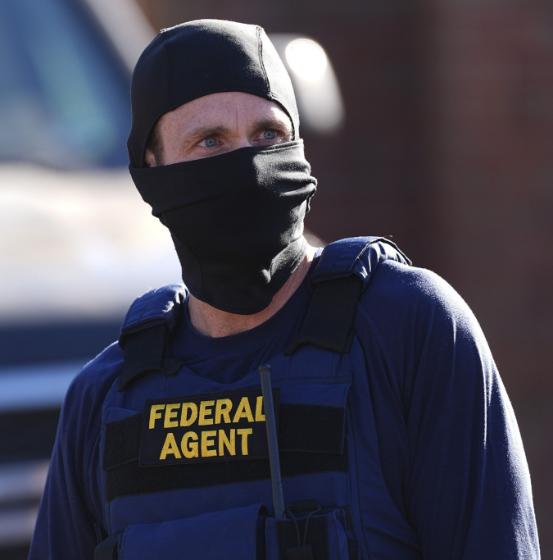

Mandy Haynes, Editor-in-Chief, Designer, Publisher, & Founder
Mandy Haynes is the author of two short story collections, Walking the Wrong Way Home, Sharp as a Serpent's Tooth Eva and Other Stories, and a novella, Oliver. Her stories have appeared in several anthologies and literary journals. She is the editor and designer of Encounters with Nature, a collaboration ofAmelia Island Writers and Artists, The WELL READ's Best of 2023 anthologies, and also the co-editor of The Best of the Shortest: A Southern Writers Reading Reunion.



Raymond L.Atkins, Contributing Editor for OFF THE PAGE
Raymond L. Atkins resides in Rome, Georgia, on the banks of the Etowah River in an old house with a patient wife and a lazy cat. His hobbies include people-watching, reading, and watching movies that have no hope of ever achieving credibility. His first novel, The Front Porch Prophet, was published in 2008 and was awarded the Georgia Author of the Year Award for First Novel. Camp Redemption, was awarded the Ferrol Sams Award for Fiction and the 2014 Georgia Author of the Year Award for Fiction. Sweetwater Blues was a Townsend Prize nominee, the 2015 GeorgiaAuthor of the Year runner-up for fiction, and the 2016 selection for One Book, Many Voices. South of the Etowah, his first creative non-fiction book, was released in 2016. It was nominated for a Push-cart Prize and was the 2016 GeorgiaAuthor of theYearAward runner-up for essay. In 2017, he was awarded the Lifetime Achievement Award by the Georgia Writers Association.


Robert Gwaltney, Contributing Editor for INSIDE VOICES
Robert Gwaltney, award winning author of southern fiction, is a graduate of Florida State University. He resides in Atlanta Georgia with his partner, where he is an active member of the Atlanta literary community. Robert’s work has appeared in such publications as The Signal Mountain Review and The Dead Mule School of Southern Literature. His debut novel, The Cicada Tree, won the Somerset Award for literary fiction. In 2023, Gwaltney was named Georgia Author of the Year for first novel.

Meet the staff


Ann Hite, Contributing Editor for MOUNTAIN MAGIC
In September of 2011 Gallery, an imprint of Simon & Schuster, published Ann Hite’s first novel, Ghost on Black Mountain. In 2012 this novel was shortlisted for the Townsend Prize, Georgia’s oldest literary award. In the same year, Ghost on Black Mountain won Hite Georgia Author of the Year. She went on to publish four more novels, a novella, memoir, and most recently Haints On Black Mountain: A Haunted Short Story Collection from Mercer University Press. In December 2022, Haints On Black Mountain was one of ten finalist for the Townsend Prize. The collection was a Bronze Winner in Foreword IndieAward 2023 and GeorgiaAuthor of the Year Second Place Winner for Short Stories 2023. Ann received a scholarship to the Appalachian Witers Workshop Hindman Settlement in the summer of 2020 and was invited back in 2021. Her passion for history influences all her work.


Jeffrey Dale Lofton, Contributing Editor for INSIDE VOICES
Jeffrey Dale Lofton hails from Warm Springs, Georgia. His years telling the stories of playwrights and scriptwriters as a stage and screen actor taught him the pull of a powerful story arc. Today, he is Senior Advisor at the Library of Congress, surrounded by books and people who love them. Red Clay Suzie is his debut novel, a fictionalized memoir written through his lens—gay and living with a disability—in a conservative family in the Deep South. It was longlisted for the 2023 Center for Fiction First Novel Prize and awarded the Seven Hills Literary Prize for Fiction, among other distinctions.

Dawn Major, Contributing Editor for TRIPLIT with D Major
Dawn Major’s debut novel, The Bystanders, was named finalist for 2024 GeorgiaAuthor of the Year for Best First Novel. Major is an associate editor at Southern Literary Review and advocates for southern authors via her blog, Southernread. Her literary awards include the following: the Dr. Robert Driscoll Award, Reinhardt University’s Faculty ChoiceAward, and the James Dickey Review Literary Fellowship. Major is a member of the William Gay Archive and has edited and helped publish the works of the late author. She serves on the board for Broadleaf Writers Association and is also a member of M’ville, anAtlanta-based artist salon. Major lives in the Old Fourth Ward inAtlanta, GA and is working on her next novel, The Dandy Chronicles.

Claire Hamner Matturro , Contributing Editor for CLAIRE CONSIDERS
Claire Hamner Matturro is a former attorney, former university writing instructor, avid reader, and the author of seven novels, including four published by HarperCollins. Her poetry appears in various journals including Slant and Lascaux Review. She is an associate editor ofThe Southern LiteraryReview and lives happily in Florida with her cross-eyed rescued black cat and her husband.



Annie McDonnell, Contributing Editor forANNIEASKS
Founder of The Write Review Literary Community, Podcaster, Book Reviewer, Author Consultant and Matchmaker. She also teaches workshops on top of all of this!Annie has been introducing us to books and authors since 2006, when she began reviewing books for Elle Magazine. Proud Stiff Person Syndrome Warrior, and several other illnesses.


Susan
Beckham Zurenda, Contributing Editor for THE WRITER’S
EYE
Susan Beckham Zurenda taught English for 33 years on the college level and at the high school level toAP students. She is author of the award-winning Southern literary novel, Bells for Eli, and the recipient of numerous awards for her short fiction, including the South Carolina Fiction Awards, twice. Her second novel, The Girl From the Red Rose Motel (Mercer University Press, September 2023), was the recipient of the 2024 Patricia Winn Award in Southern Fiction, Gold Medal winner in the 2024 IPPY Awards for Southeast Fiction, a 2024 Pushcart Prize nominee, a Shelf Unbound 2023 Notable 100 books, and a finalist in theAmerican Book FestAwards. Susan lives in Spartanburg, SC.

Fucking Hipsters by Mandy Haynes
Dedicated to my fellow East Nashvillians who mourn the loss of a great city...
Frank ignores the young doctor and wonders if he might be having a heart attack and welcomes the idea. He has no control over the flood of tears that pours from his eyes, or the way the muscles contort and pinch in his face. The pain comes from deep in his stomach, forcing its way into his chest. It feels as if his ribs might break before the pressure rises up his neck and pushes its way out of his mouth.
“Fucking hipsters …” he says before another wail chokes off the rest of the sentence.
The young therapist’s eyebrows are the only things that move. She quickly brings them back down and adjusts her glasses. This is not what she expected, but she’s glad to hear his voice. She sits behind her poker face and waits for him to continue. Several minutes pass before she attempts to hand him the box of tissues. If he notices the tissues she offers, he ignores them. She pauses before deciding to put the box back on the table and starts to wonder if she heard him correctly. Hadn’t she just said the same thing this morning as she jogged past the new and socalled improved Dino’s? Fucking hipsters, she’d cursed under her breath as she ran past the litter of red plastic cups and cigarette butts left out on the sidewalk from last night’s crowd.
"It may be fiction but it's all true. Mandy writes razor-sharp, down-to-the bone southern tales about total strangers that you've known your whole life. She knows us better than we know ourselves. This is the good stuff." Mike Henderson, singer/ songwriter, musician
"A great read for all us humans." Caleb Mannan, author of Bust It Like A Mule
"From her mind come people who inspire and infuriate and inform. They'll make you ache and smile and sigh, all at the same time." Peter Cooper, journalist, author, singer-songwriter
"Mandy Haynes is a no-nonsense writer who cuts straight through to the core of what life is about with all of the characters she creates. Every story is filled with an honest, raw, and beautiful dance. Such a treat to read." Chuck Beard, freelance writer, editor, and author, owner of East Side Story
"Mandy Haynes has an amazing voice that reaches right in to your gut. A talent like this is rare, and I look forward to seeing more from her soon." Nadia Bruce-Rawlings,Author of Scars
"Her stories give voice to the humor, sorrow, and sometimes even horror in the lives of people in the small towns and down the dirt roads of the South." Wayne Wood, journalist, author of Watching the Wheels: Cheap irony, righteous indignation and semi-enlightened opinion


